News and events
2023-24
- Prof Bob Baker recognised with Excellence in Teaching Award
- School of Chemistry hosts the 75th Irish Universities Chemistry Research Colloquium
- Congratulations to School of Chemistry MAJO Graduates
- DubChem 3rd Year Talks 2024
- A Send-off for the Class of 2024
- The Chemistry of Equality, All-Ireland Network for Gender Equality in Chemistry
- Trinity Monday 2024 – Fellows and Scholars
- Trinity chemistry student, Áine Coogan, joins prestigious CAS Future Leaders™ Program
- Congratulations to Fabio Santanni on receiving Funding under the Marie Skłodowska-Curie Actions Postdoctoral Fellowship Awards
- Scientists develop colour-changing dyes that light up cellular activity
- Athena SWAN Silver celebration and School Christmas gathering
- Congratulations to Chemical Sciences Student, Joy Aladejana who was one of five recipients of the Three Ireland Connect to STEM Scholarships 2023
- VACANCY: Research Fellow in Chemistry Education and Public Engagement (EPE)
- Prof Isabel Rozas hands over coffee morning cash to UNICEF
- Coffee morning in aid of UNICEF
- Lifetime achievement award for John Boland At Trinity Innovation Awards
- Graduation Day for Class of 2023
- Prof. Valeria Nicolosi receives the Diels-Planck Medal
- Intel®Rising Star Faculty Award for Prof. Larisa Florea
- Professor Emeritus Thomas Brian Hamilton McMurry R.I.P.
- Athena SWAN Silver Award for the School of Chemistry
Prof. Bob Baker Recognised with Excellence in Teaching Award

Congratulations to Prof. Bob Baker who was recognised on Monday 25th June with a School Excellence in Teaching Award.
Nominated by students, staff and alumni for their outstanding contribution to teaching in the university this year, the winners were selected by School-based panels and announced by Provost Linda Doyle who applauded their commitment to teaching.
Provost Linda Doyle said: “Each of us will remember a teacher or lecturer who inspired us to think differently or encouraged us to do things we thought were beyond our reach. The Trinity Excellence in Teaching Awards recognise those who go above and beyond in their teaching and I am very proud of this year’s recipients. They are all hugely dedicated to their students, innovative in and outside the lecture theatre, and incredibly inspiring.”
Bob's students said in his nomination: “His charisma and expertise in the subject matter that he was teaching was exemplary, and he made it very easy for us who were unused to college life to get into the swing of things...Overall, his teaching was of a spectacular standard, and I feel he most certainly deserves to be recognised for it”.
Congratulations Bob on this fantastic achievement!
School of Chemistry hosts the 75th Irish Universities Chemistry Research Colloquium

The School of Chemistry was delighted to host the 75th Irish Universities Chemistry Research Colloquium on June 17th & 18th. The conference was very well attended and the standard of research was excellent with over 100 postgraduate students presenting their work in oral or poster format.
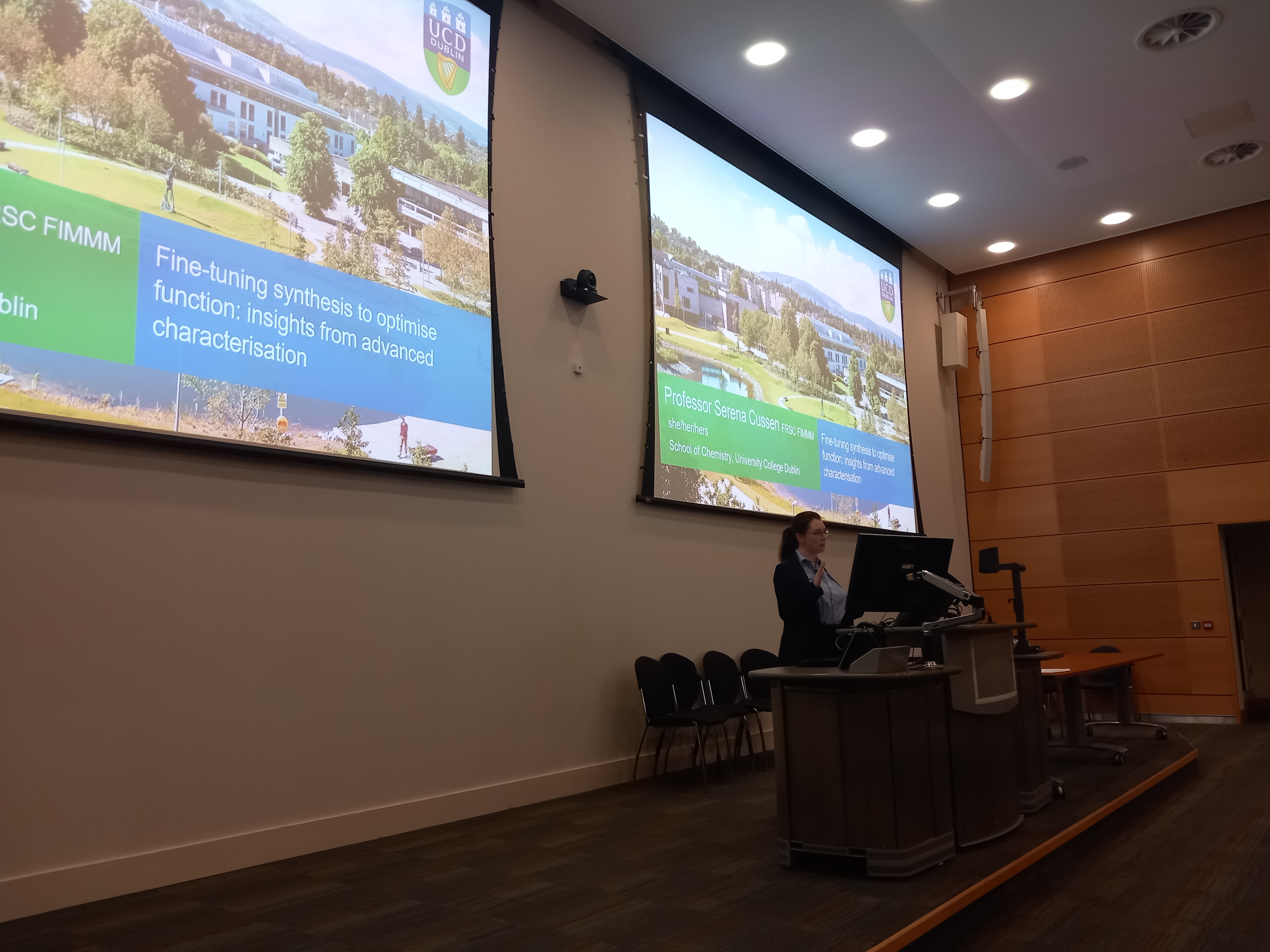
There were four very interesting keynote lectures during the two days given by Prof. Serena Cussen of UCD, our own Prof. Chris Batchelor-McAuley, Prof. Dorota Gryko from the Polish Academy of Sciences, and Dr. Marc Kielmann of the Beilstein Institut. The ICI Postgraduate Award Lecture was also delivered at the event by the 2024 awardee, Dr. Ellen Fay of TCD.

Prizes were awarded in each oral presentation category, the four best poster presentations overall and two additional prizes sponsored by Eurachem for the best Analytical Chemistry oral and poster presentations.
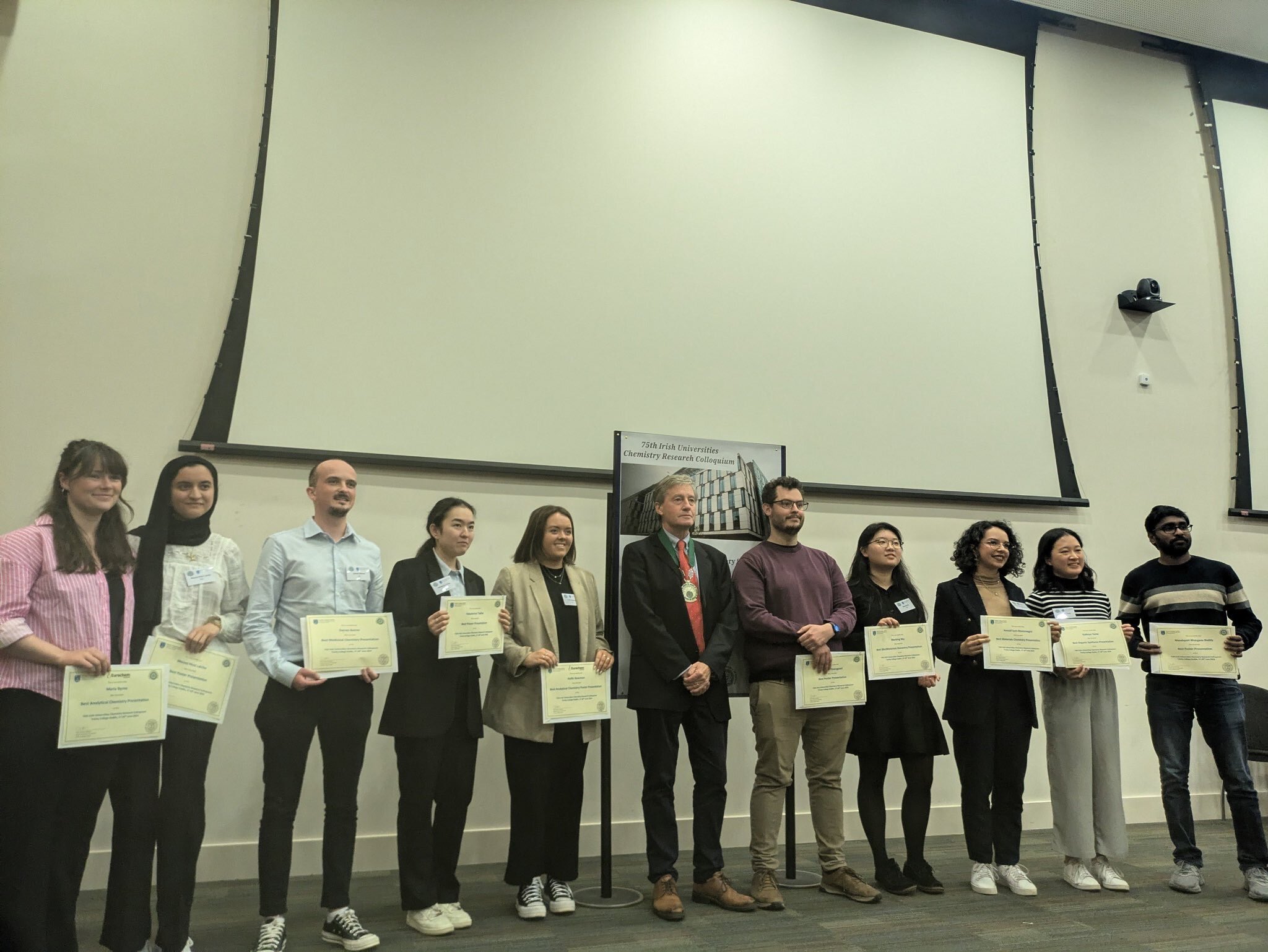
Oral Presentation Prizewinners:
Best Organic Synthesis Presentation: Kathryn Yeow (University College Dublin)
Best Materials Chemistry Presentation: Annaël Sort-Montenegro (Trinity College Dublin)
Best Medicinal Chemistry Presentation: Darren Beirne (Maynooth University)
Best (Bio)Materials Discovery Presentation: Manting Mu (Trinity College Dublin)
Poster Presentation Prizewinners:
Mouna Hind Laiche (Royal College of Surgeons in Ireland)
Joshua Thorogood (Trinity College Dublin)
Mandapati Bhargava Reddy (University College Dublin)
Yekaterina Tskhe (Trinity College Dublin)
Eurachem Analytical Chemistry Prizewinners
Oral Presentation: Maria Byrne (University College Dublin)
Poster Presentation: Aoife Newman (Maynooth University)

Congratulations to all involved in making this an extremely successful event!
Congratulations to School of Chemistry MAJO Graduates
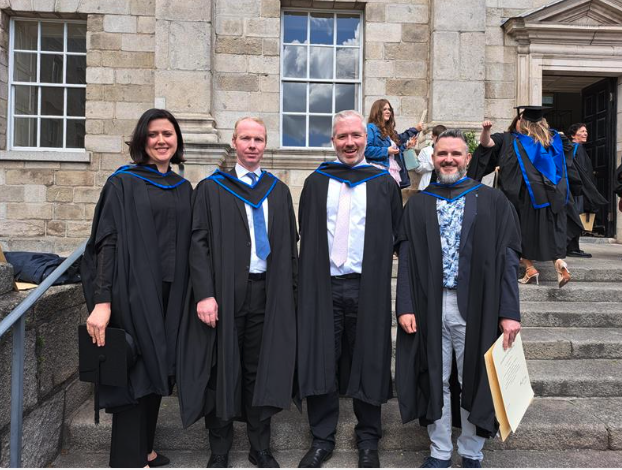
Congratulations to School of Chemistry staff members Oxana Kotova, Mark Keegan, Peter Brien and Gary Hessman who earned the MA (Jure Officii) (MAJO) degree from Trinity College Dublin. This degree honors dedicated service to the college community and is awarded to academic and non-academic staff with over 10 years continuous service.
In an email to the college community, Professor Neville Cox, Registrar at Trinity College Dublin said: "The ceremonies were truly joyful and truly poignant and a wonderful recognition of the reality that Trinity, as a university and a community is utterly dependent on all members of staff, that everyone’s role is equally critical to the university’s mission and that nobody is or should be taken for granted. At a personal level, I was deeply honoured to be present at these events and am deeply privileged to be a member of this Trinity community and to have such wonderful colleagues."
The School of Chemistry is very proud of our dedicated staff members adn we would like to express our thanks and congratulations to the graduates for their years of hard work!
DubChem 3rd Year Talks 2024
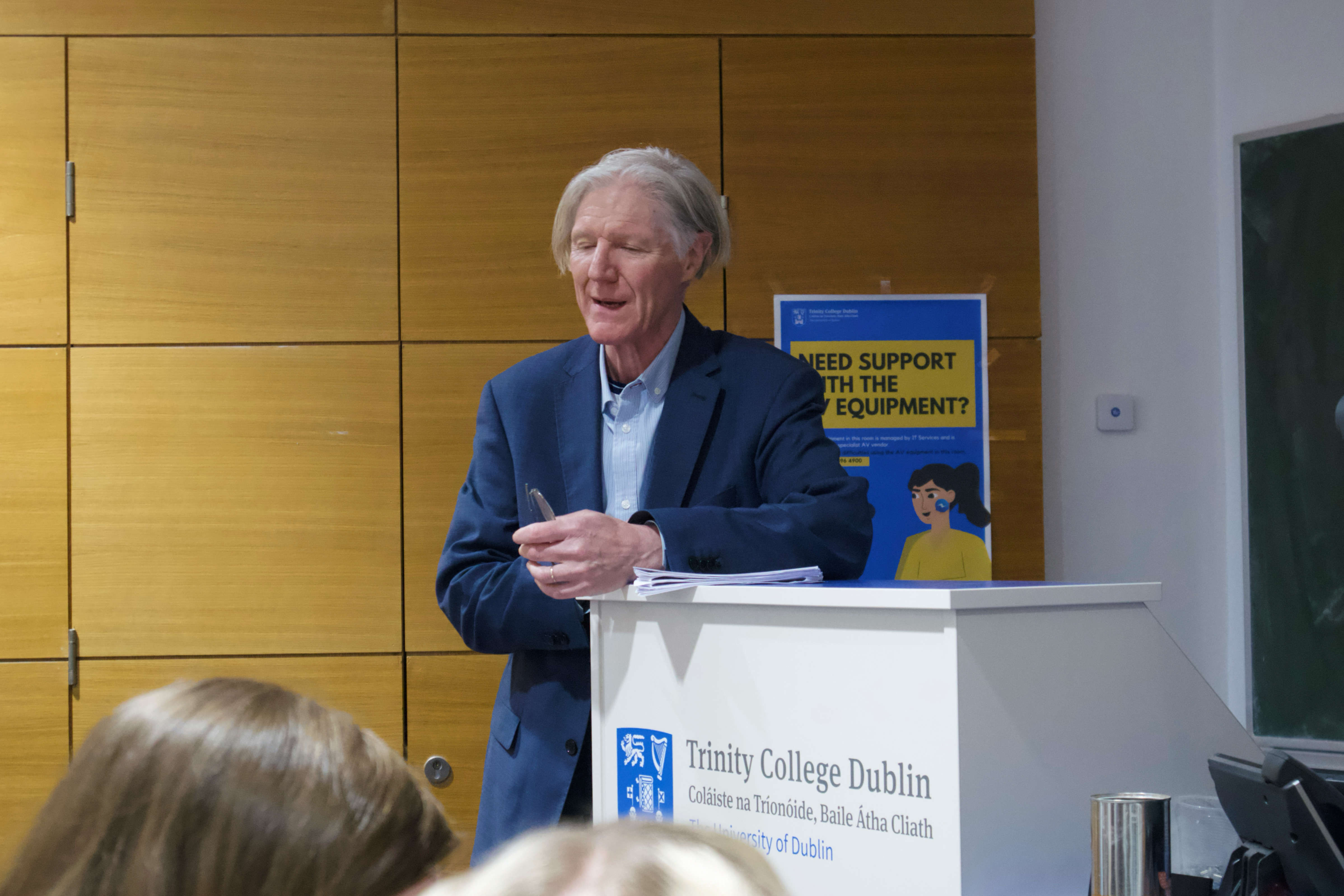
Well done to all of the TCD and UCD Chemistry 3rd Year PhD students who gave talks on Wednesday 29th of May. The standard of presentation was truly excellent and the breath of research really exceptional. It was extremely difficulty to pick winners! Congratulations to Filippo Pota from the Colavita Research Group, and to Luisa Lavelle from the Florea Research Group who were among the prizewinners.
40 students presented on the day, with 15 TCD School of Chemistry research groups represented. It was a wonderful day which demonstrated the wide breadth of chemistry research in both TCD and in UCD. Thanks to Eli Lilly for their sponsorship.
A Send-off for the Class of 2024
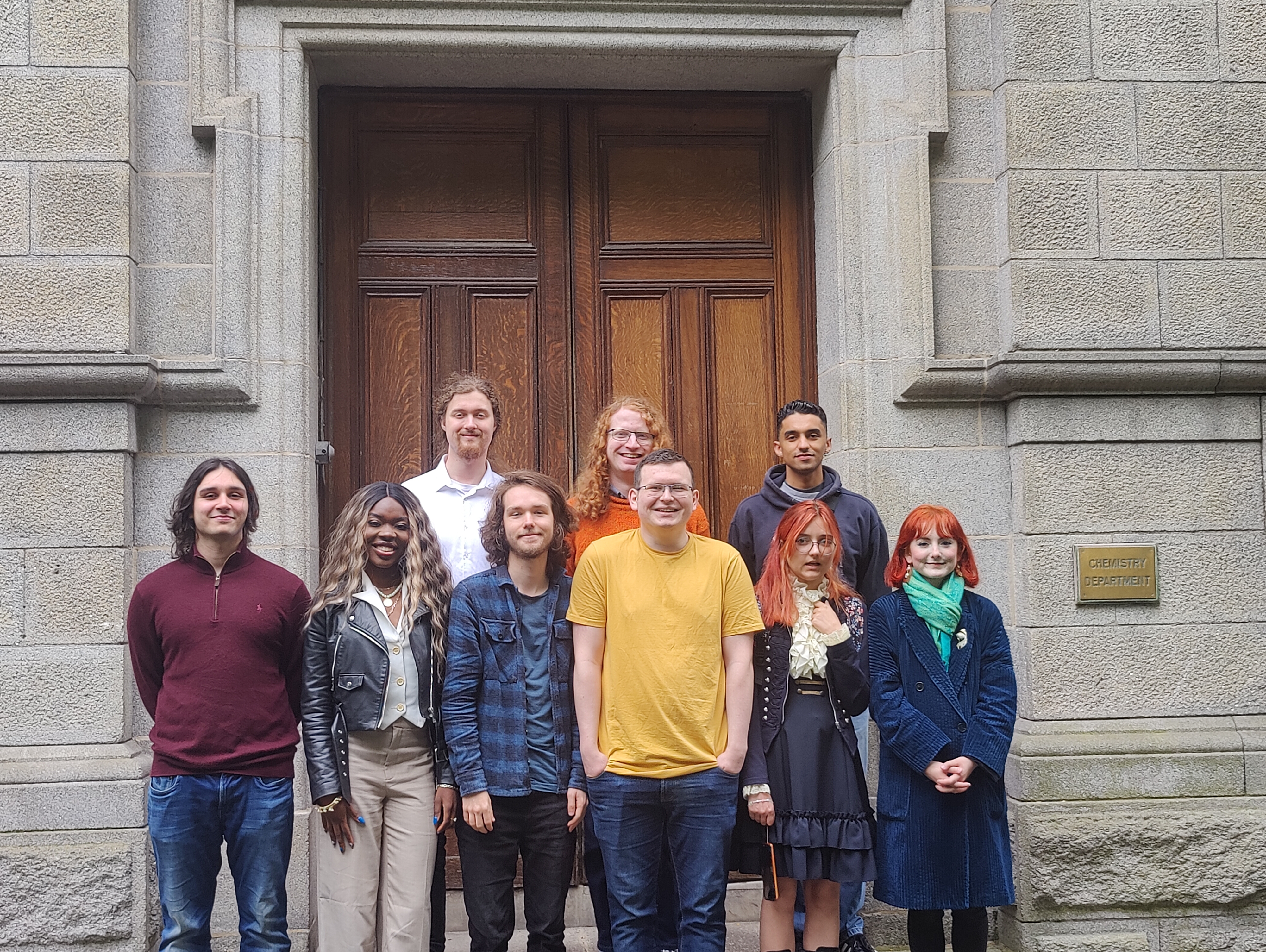
The Senior Sophister class of 2024 received their results on Friday 24th May after 4 years of hard work. A celebration of their achievement was held for them in the Pav that afternoon. Some of the group met outside the Chemistry building for a class photograph and then moved across to the the Pav where students and staff were unwind from exam stresses over some food and a drink or two.
The School of Chemistry is extremely proud of the achievements of this year's graduating class and we are greatly looking forward to following their careers as they move on to new adventures.
Congratulations Class of 2024. Best of luck for the future and don't forget to keep in touch!
The Chemistry of Equality, All-Ireland Network for Gender Equality in Chemistry
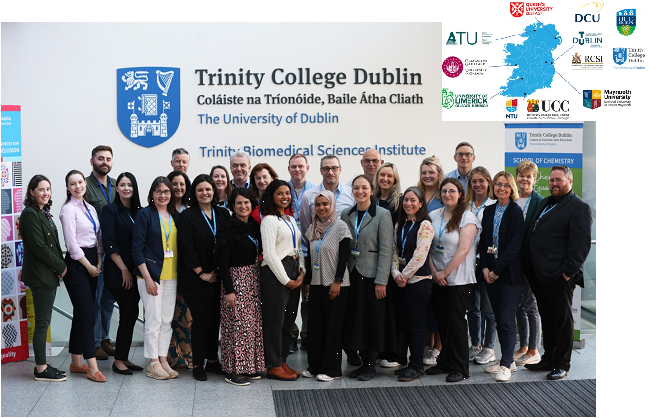
Last week, the School of Chemistry’s EDI committee organised the 2024 in-person meeting for the All-Ireland Network for Gender Equality in Chemistry. The meeting, titled The Chemistry of Equality, was funded by the GENDER EQUALITY ENHANCEMENT FUND 2023, and brought together representatives from all Chemical Sciences Departments in Ireland, who shared ideas and best practices in order to promote EDI actions within our schools and institutions. This network is the first of its kind in the country, building the first national EDI STEM Network.
The meeting consisted of invited presentations from Ireland and UK CSs Athena Swan holders (Prof. Paul Kavanagh, School of Chemistry and Chemical Engineering, QUB; Prof. Graeme Watson, School of Chemistry, TCD), and the RSC’s Inclusion & Diversity committee (Dr. Ilaria Meazzini, MRSC, Senior Programme Manager). Additionally, Prof. Elaine O'Reilly (School of Chemistry, UCD) highlighted the RISE initiative funded by the RSC, that offers structured mentoring and practical experience to Retain, Inspire, Support and Enhance (RISE) undergraduate students from ethnically underrepresented groups in the Chemical Sciences.
The role of this Network is to empower a culture of gender equality across the Chemical Sciences in Ireland and enable us to become a beacon within and beyond their institutions by leveraging sectoral experience and collating relevant shared data. The Network will continue to meet online to discuss challenges, share best practice, and assist with planning to advance EDI activities and actions at local and national level.
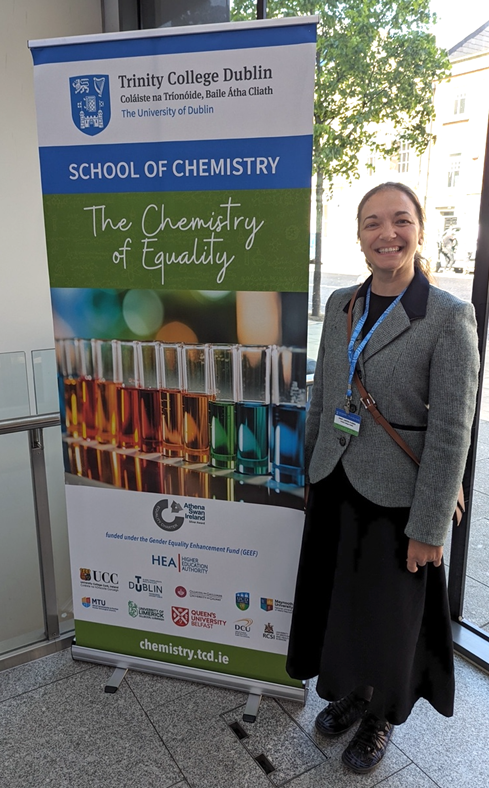
Trinity Monday 2024 - Fellows and Scholars
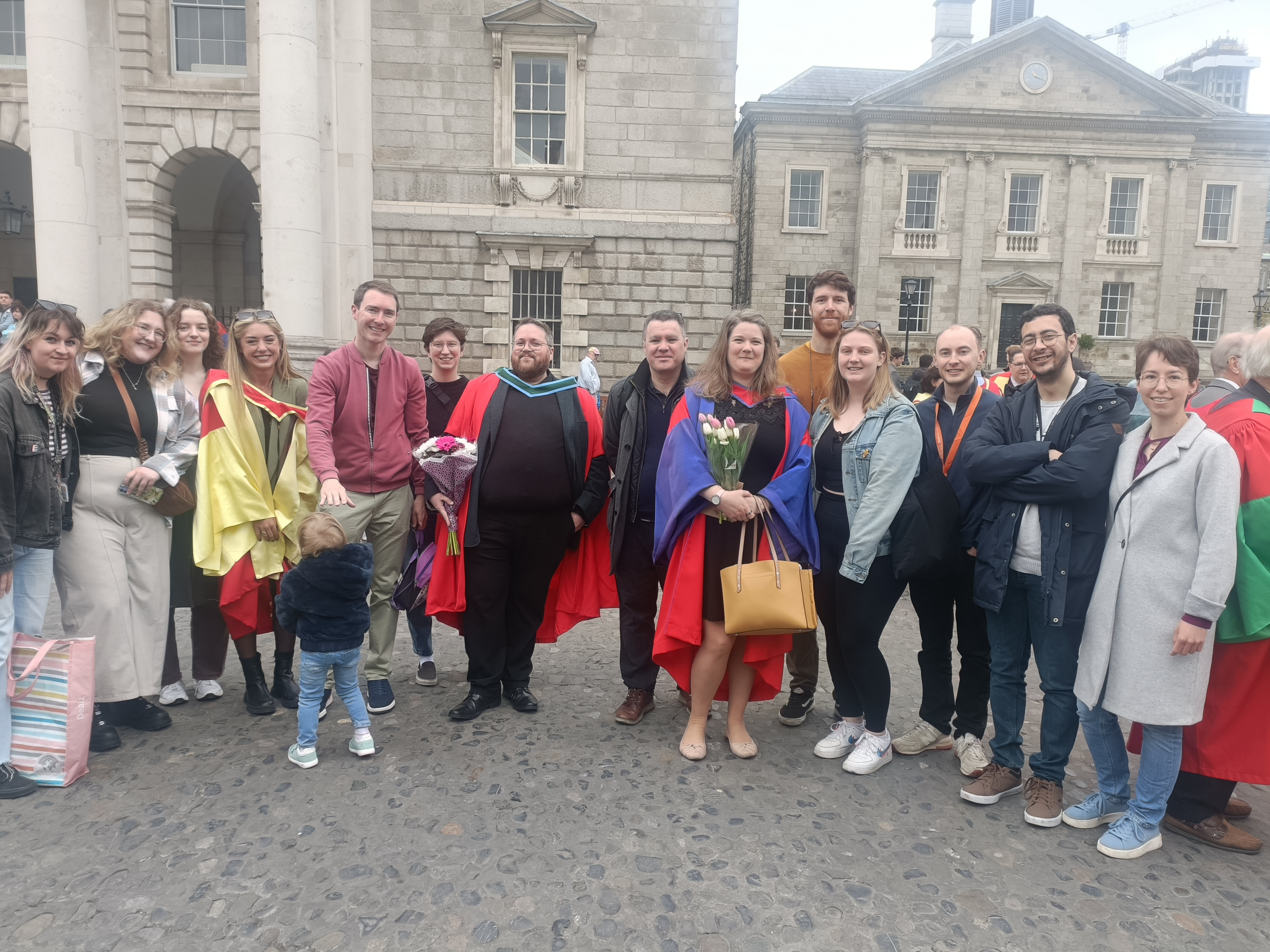
The School of Chemistry was delighted to gain two new Fellows and two new Scholars on Trinity Monday this year.
Congratulations to Professors Joanna McGouran and Peter Dunne who were elected to College Fellowship.
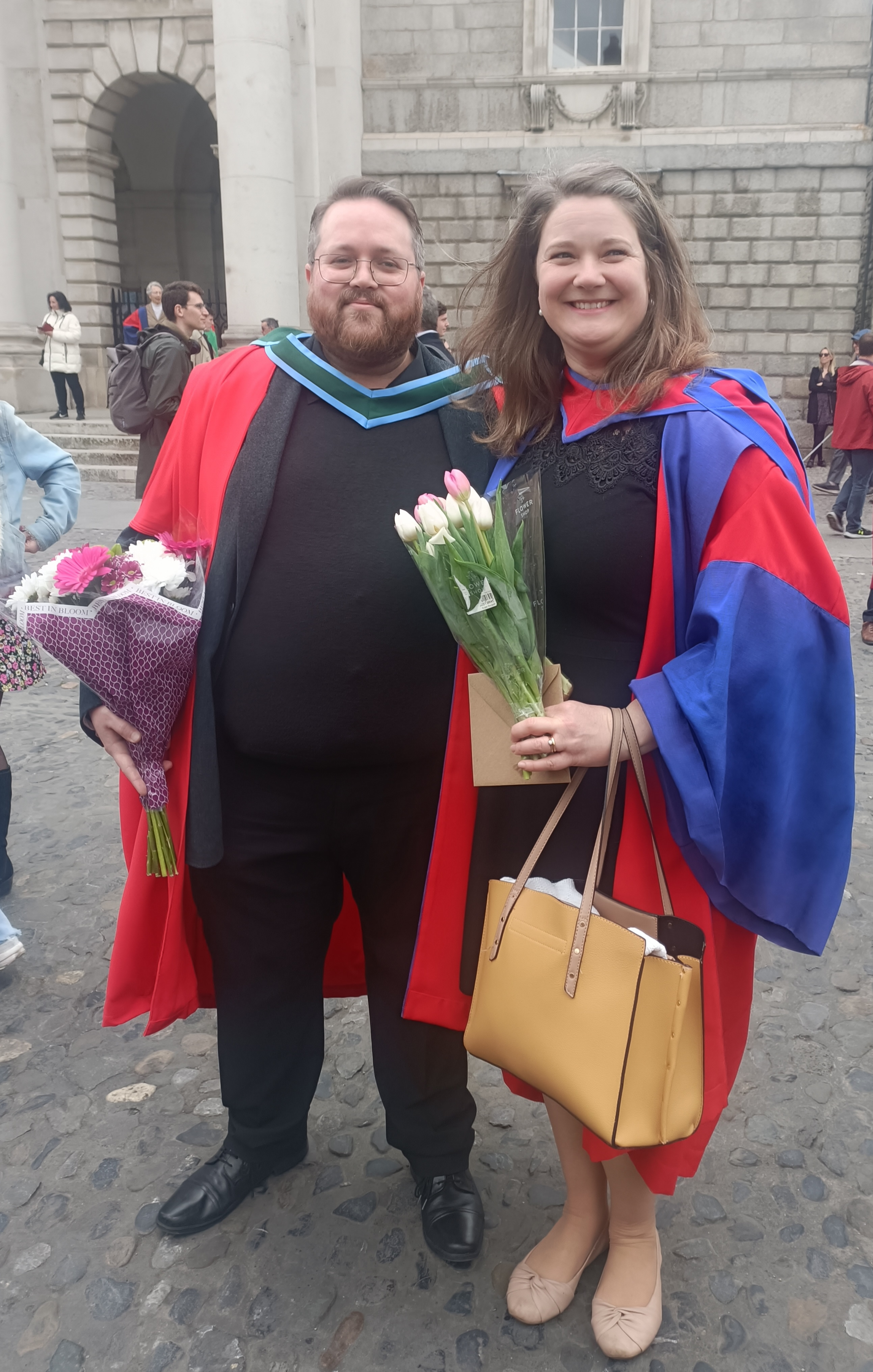
Joanna McGouran is the Schuler Assistant Professor in Translational Organic Chemistry in the School of Chemistry. Prior to her appointment in 2016 Joanna obtained a 1st class M.Chem. degree and Ph.D. in Chemistry from the University of Oxford, as well as postdoctoral experience in Medicine and Chemical Biology. Her research focusses on biomolecule modification to design highly novel, bespoke probes. These probes determine not just enzyme abundance but measure their activity in complex biological systems. This extremely powerful approach can tell us not just if an enzyme is there, but really tell us what it is doing. These probes are critical to our understanding what biological processes have gone awry in disease states and how effective potential therapeutics are in remedying these changes.
Peter Dunne completed his degree in chemistry at the National University of Ireland, Galway, where he remained to carry out his Ph.D. research under the supervision of Profs. Des Cunningham and Pat McArdle. He then joined the group of Prof. Richard Walton at the University of Warwick developing hierarchical catalysts for the abatement of pollutants. Subsequently he moved to the Chemical Engineering Department at the University of Nottingham as a postdoctoral fellow under Prof. Ed Lester, where he established large-scale continuous-flow hydrothermal and solvothermal routes to a wide variety of inorganic nanomaterials. In 2016 Peter took up his post as Assistant Professor of Inorganic Energy Materials in the School of Chemistry at Trinity College Dublin. He has been the course director of the Nanoscience moderatorship (joint with the School of Physics), and is currently the deputy chair of the School’s EDI committee. His group’s research focus is on the development of cleaner, greener routes to functional nanomaterials including transparent conducting oxides, quantum dots, carbon dots, and magnetic nanoparticles.
Also, congratulations to TR061 Chemical Sciences students Ziga Roblek and Tiago Marques, who were elected to Scholarship.
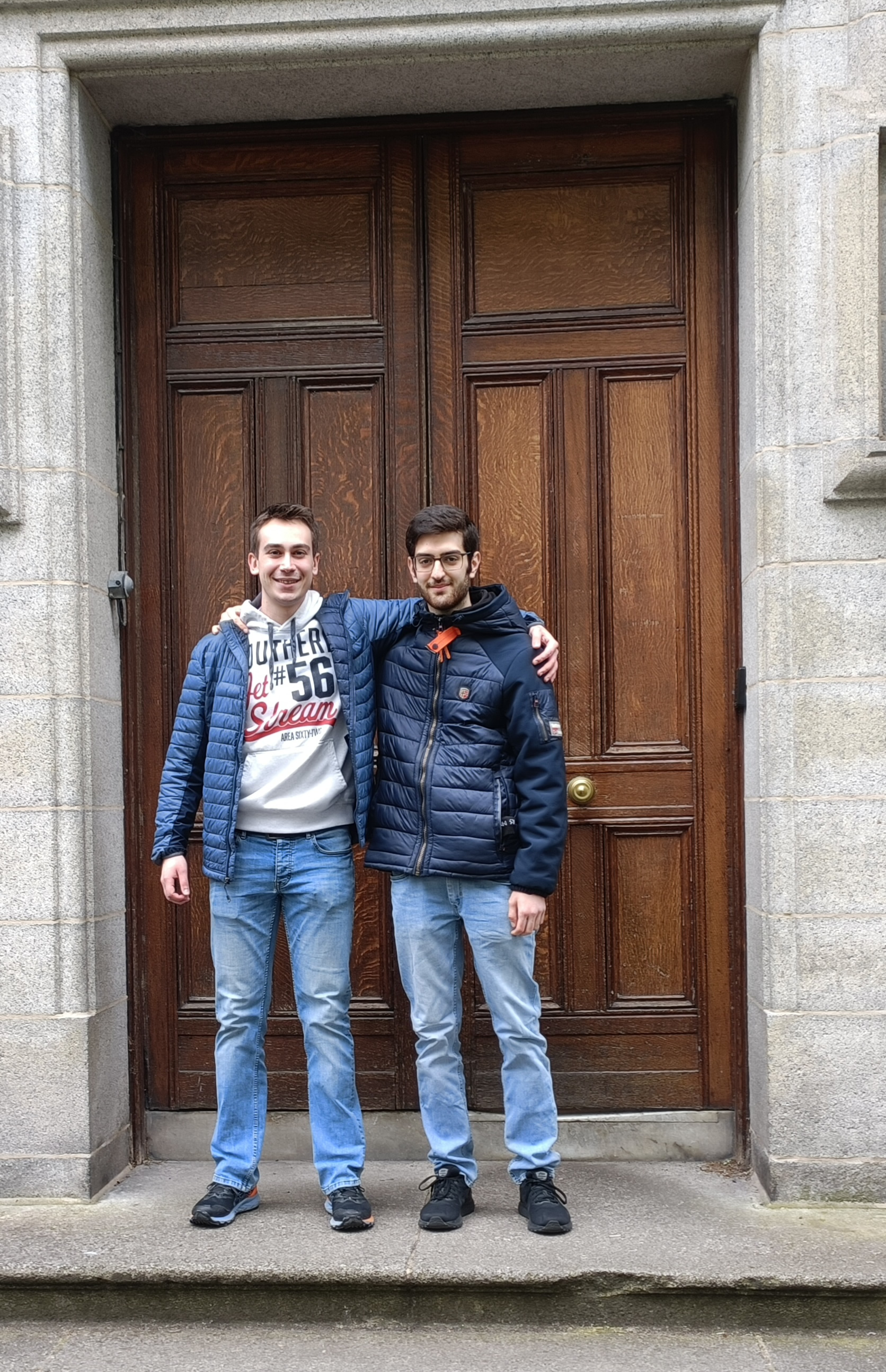
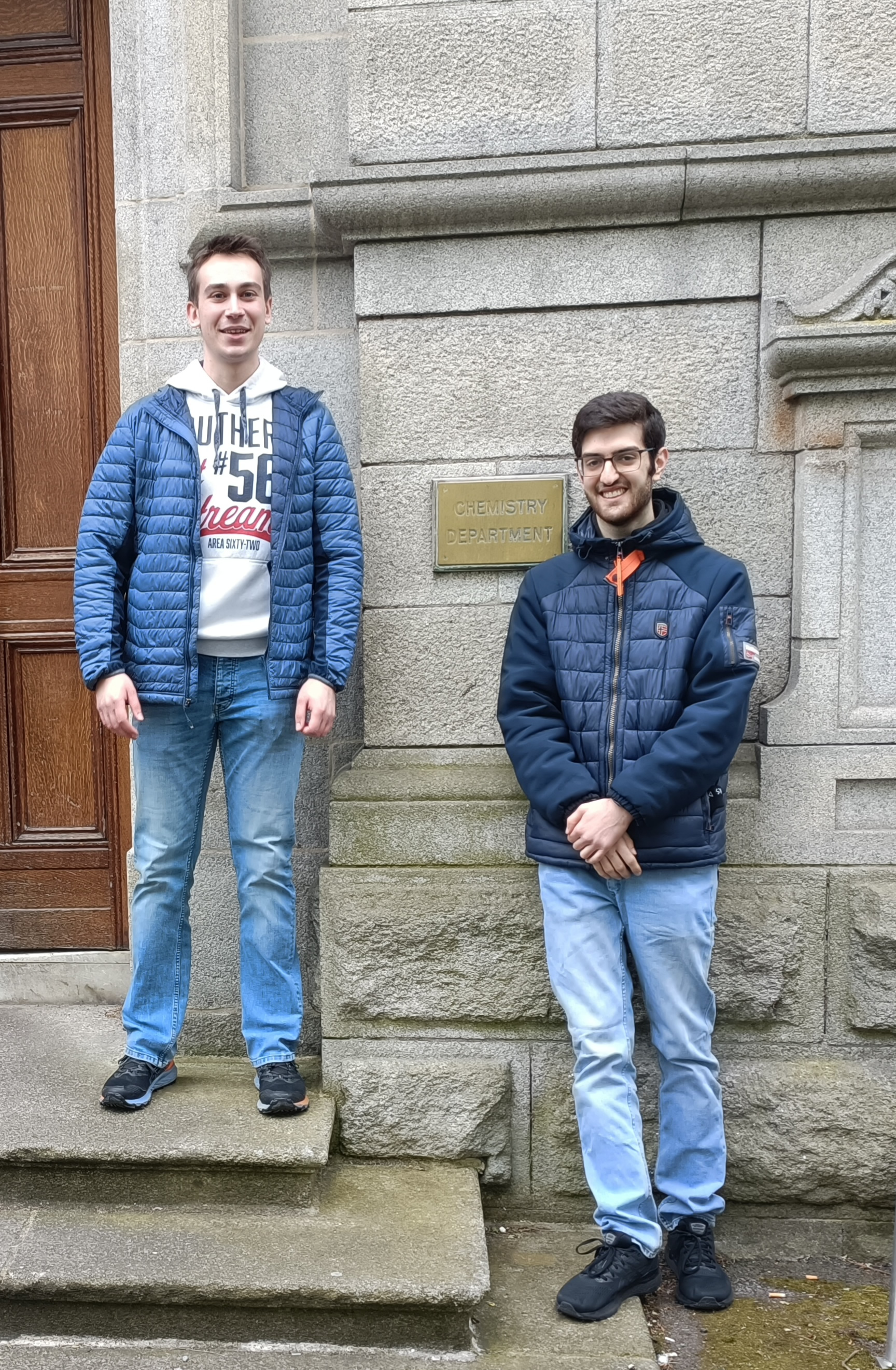
Well done to all students who sat the exams and congratulations to all newly elected scholars on Trinity Monday. It is a great achievement.
See here for a full list of Fellows and Scholars elected on Trinity Monday 2024
Scientists develop colour-changing dyes that light up cellular activity
/prod01/channel_3/media/tcd/news-images/lab-work.jpg)
Scientists from the School of Chemistry's Gunnlaugsson group, in collaboration with the Royal College of Surgeons in Ireland (RCSI), have developed special fluorescent, colour-changing dyes that, for the first time, can be used to simultaneously visualise multiple distinct biological environments using only one singular dye.
When these dyes are encapsulated in delivery vessels, like those used in technologies like the COVID-19 vaccines, they “switch on” and give out light via a process called “aggregation-induced emission” (AIE). Soon after delivery into the cells their light “switches off” before “switching on” again once the cells shuttle the dyes into cellular lipid droplets.
Because the light coming from inside the cells is of a different colour and occurs within a different time-window to the light coming from the same dye inside the delivery vessels, the researchers can use a technique called “fluorescence lifetime imaging” (FLIM) to distinguish between the two environments in real time.

Luminescence changes of the same dye moving from pure organic solvent, left, to water, right.
The work was recently published in leading international journal, Chem. First author, Dr Adam Henwood, Senior Research Fellow in the School of Chemistry and based at the Trinity Biomedical Sciences Institute (TBSI), worked on this design with PhD student Connie Sigurvinsson.
Dr Henwood explained: “Bioimaging relies on “on/off” dyes where the dyes only emit light under one set of conditions but are otherwise switched off. This is extremely useful, but it does mean that you can only look at one place at a time under your microscope. The exciting part about this work is that our dyes hit a sweet spot that gives them distinctive on/off/on properties and, crucially, we can both observe and differentiate these different “on” states.
“So, we both see more and see better than before. We do this by timing how long it takes for the light coming from our samples to reach the microscope: light from the delivery vessels takes marginally more time than light from within the cells. By collecting enough light signals, we can use this information to rapidly build up precise 3D images of the two different dye environments. The time differences are small – just a few billionths of a second either way – but our method is sensitive enough to capture it.”
This unique quality means the dyes could have a huge suite of applications and, for example, hold the potential to revolutionise bio-sensing and imaging approaches.
Because these dyes can help scientists map the intricate structures within living cells with such high contrast and specificity, they could help illuminate how drugs are taken up and metabolised by cells or allow scientists to design and conduct a range of new experiments to better our understanding of the complex inner workings of cells and their all-important biochemical machinery.
In the published journal article, the scientists focused on using the dyes to image cellular lipid (fat) droplets, which are one example of important “organelles” that make up living cells in most complex organisms (like us humans).
Lipid droplets, once considered to be simple “fat reservoirs”, are now believed to play an important role in regulating cellular metabolism, coordinating lipid uptake, distribution, storage and use in the cells. Because of this growing understanding of their importance, and because sudden changes in their activity often indicate cellular stress, they serve as a useful test case scenario for the dyes. One potential avenue of further research is to see whether the team can target other important cellular organelles with their dyes.
Thorfinnur Gunnlaugsson, Professor of Chemistry in the School of Chemistry at Trinity and based in TBSI, is the senior author of the article. He said:
“Being able to monitor cellular function or the flow of molecules or drug candidates within cells by observing different fluorescence emission colours is extremely attractive. The breakthrough here is that we can resolve and use the difference in their fluorescence lifetimes to identify these same probes within different cellular environments in a fast and accurate manner, literally allowing us to map out their colourful “time travel” within the cells.
“Most exciting, however, is that this phenomenon is not just applicable to cellular imaging. These results open up new possibilities in everything from studying chemical biology, as we have shown here, to many other medical applications and even in the generation of novel functional materials for use beyond biology. Any molecular or nano material that requires controlled molecular motion can in principle be mapped and fine-tuned using our new method.”
And indeed, it is here where the authors intend to cast the net far and wide. They envisage many new possibilities for these dyes, pointing toward their exceptional sensitivity as attractive for developing sensors of hazardous environmental pollutants or using their bright, light-emitting properties to power chemical transformations, analogous to nature’s own photosynthesis.
The research has both an international (eight nations are represented) and Irish feel to it, with the latter’s key funding bodies the Irish Research Council (IRC) and Science Foundation Ireland both playing critical financial support roles. Most notable is SFI’s Research Centre for Pharmaceuticals, SSPC, which principally funded the work, as well as contributions from the SFI AMBER centre and through the AMBER-based EPSRC-SFI Centre for Doctoral Training Programme.
Prof. Damien Thompson, Professor of Physics at the University of Limerick and Director of the SSPCsaid: “As a centre, we keep pushing forward and creating new knowledge at the interface of materials and biology. This collaborative work between two of our principal investigators at Trinity and RCSI showcases the power of fundamental science to drive innovation in medicine. The closer we look at the molecule-cell interface, and crucially, the better we can see, in real time, how molecules diffuse from place to place inside the cell nanomachinery, the closer we get to realising Richard Feynman’s dream of understanding everything that living things do from the wiggling and jiggling of atoms.
“But only recently have researchers had sufficient experimental and computational resources to track these motions and vibrations in complex biological environments. This exciting new work demonstrates more specific, high contrast imaging of subcellular dynamics, which will in turn enable researchers to develop more effective drug formulations with reduced side effects.”
Professor Donal O’Shea, who oversaw the investigation, is an expert in cell imaging based in RCSI’s Department of Chemistry and Super-Resolution Imaging Consortium (funded by Science Foundation Ireland, SFI). He added: “Our use of FLIM to track dynamic AIE interactions with living cells is an approach that can have broad applicability for other fluorophore systems allowing insights to be gained that were previously hidden.”
The journal article can be read on the publisher's website,
Athena SWAN Silver celebration and School Christmas gathering

On Thursday,December 7th , the staff of the School of Chemistry held a gathering to celebrate the school's achievement in receiving a silver Athena SWAN award. The event also served as the School Christmas celebration with wine kindly donated by Head of School, Graeme Watson and Professor Emeritus, David Grayson and mulled to perfection in the post room by Manuel.
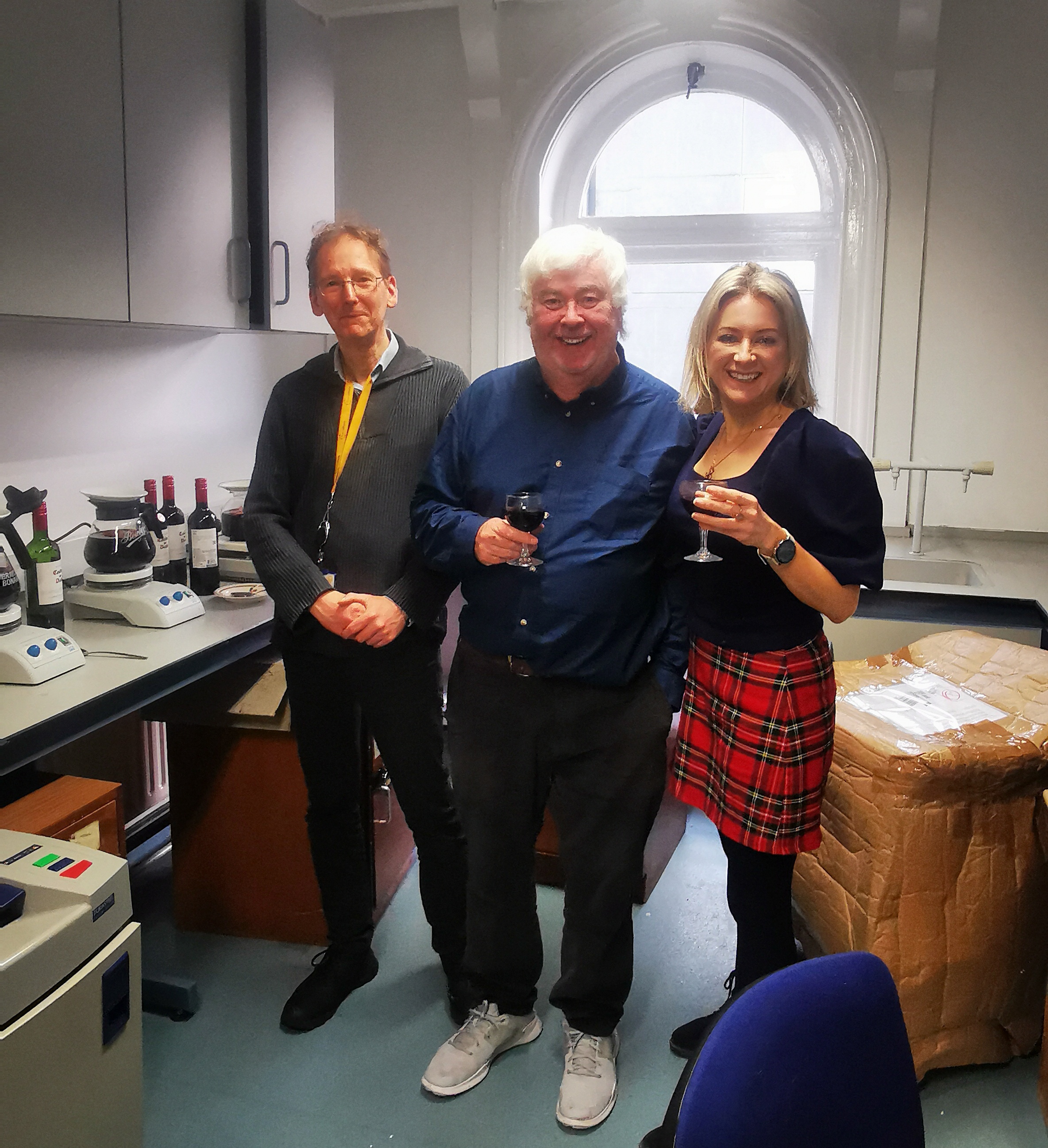
A presentation on the feedback from the Athena SWAN application and looking to next steps was given by the new head of the EDI committee, Larisa Florea and afterwards the party moved to Moss Lane on Pearse street for some festive drinks and a welcome chance to socialise with colleagues
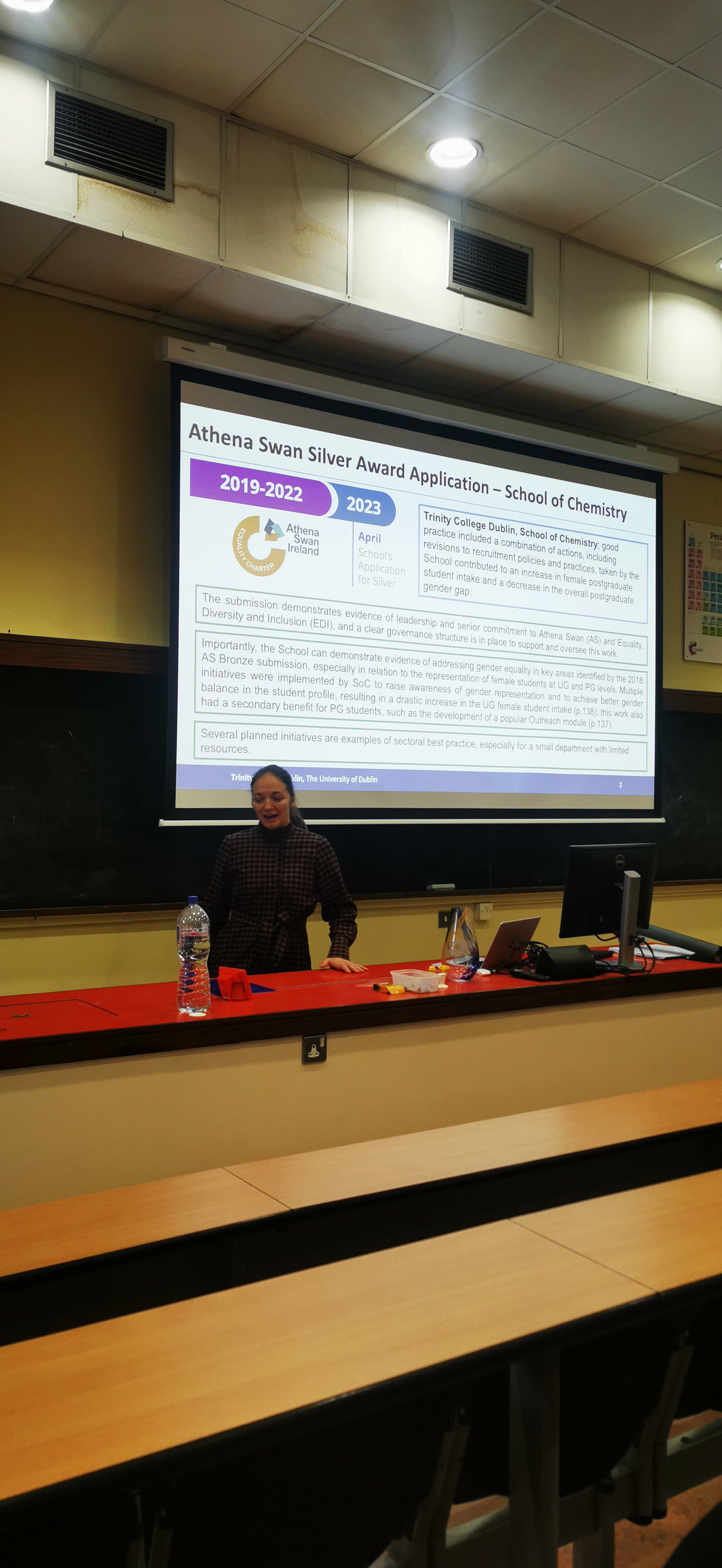
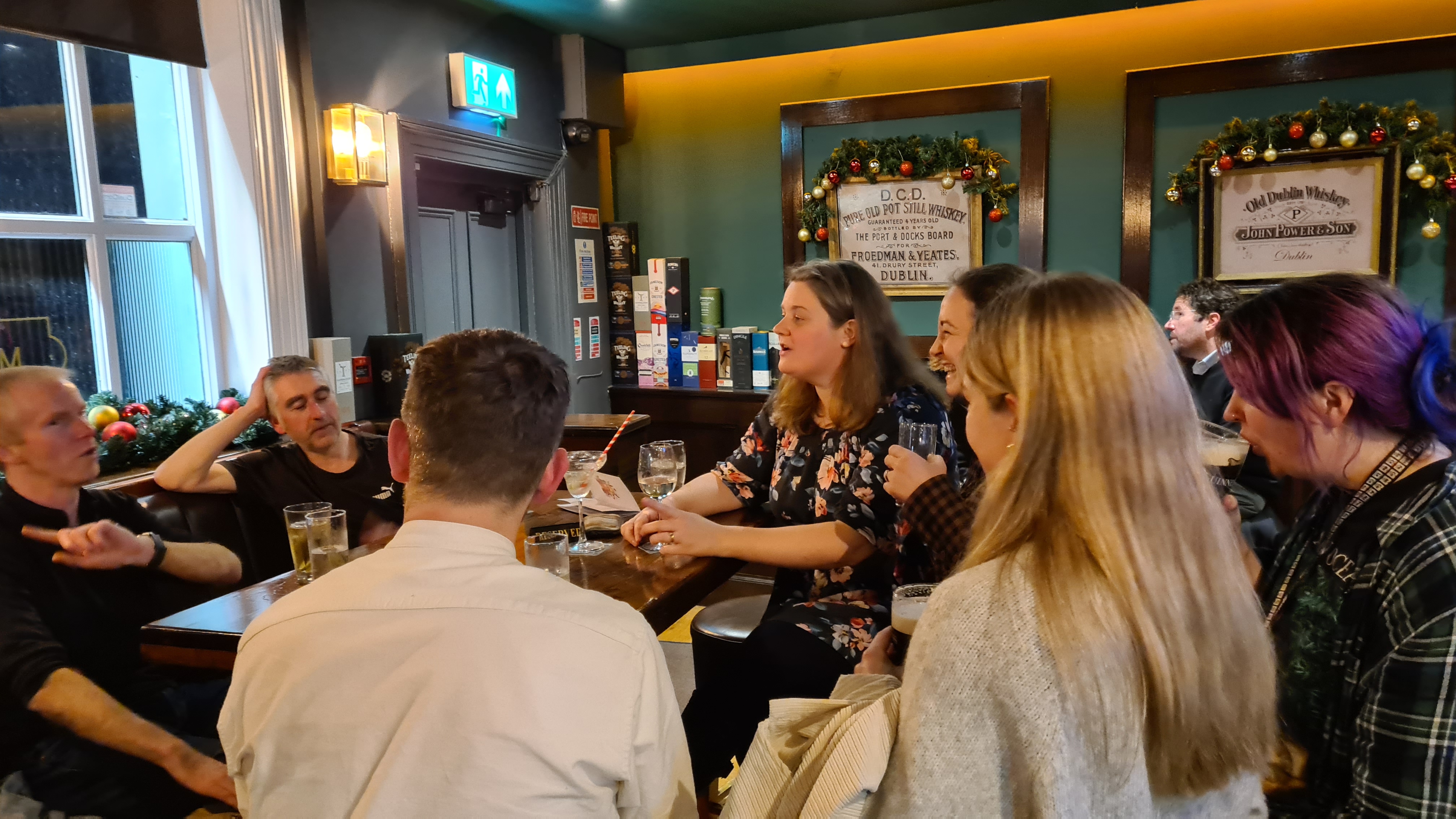
Coffee Morning Money Handed to UNICEF
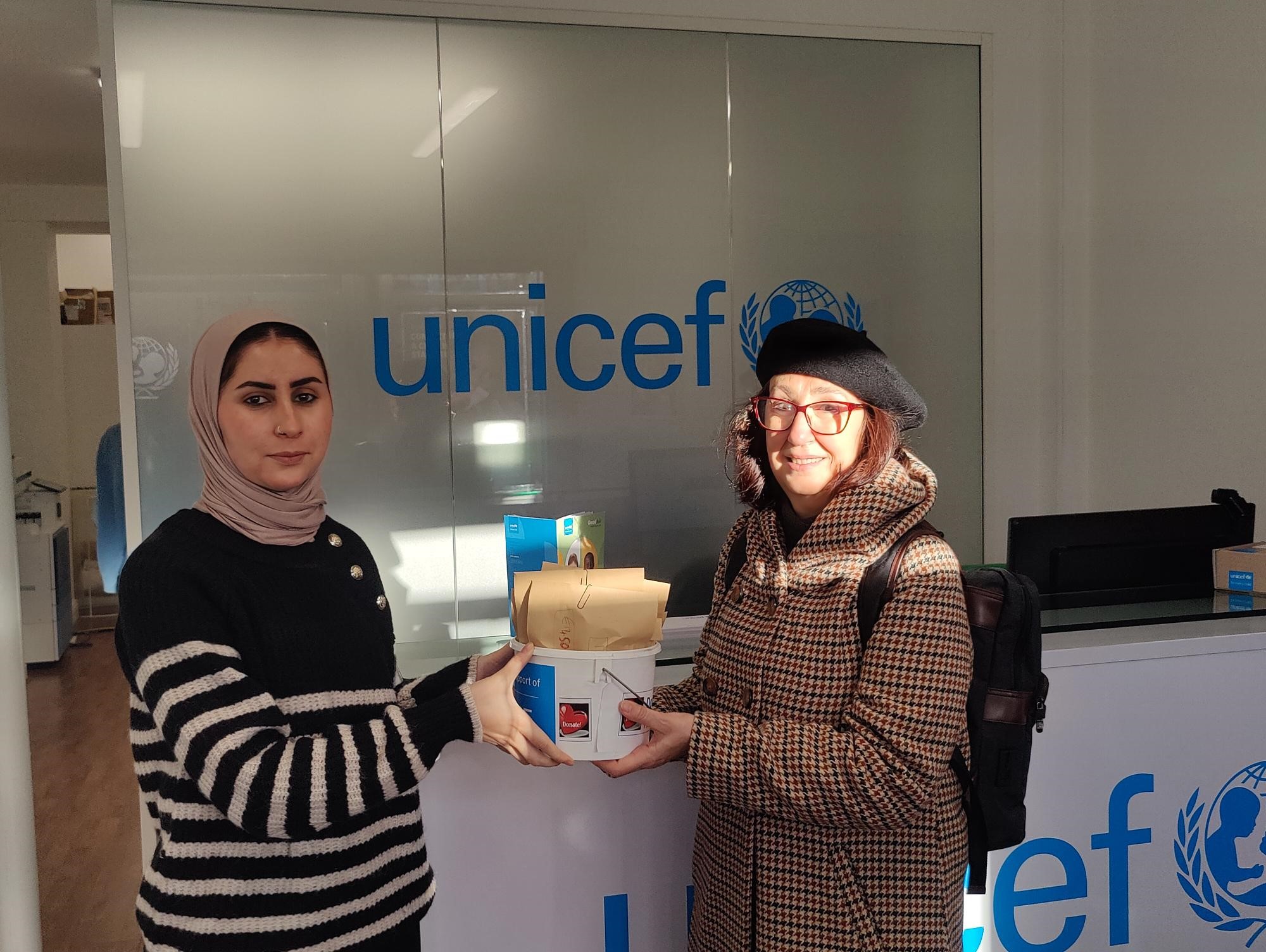
On Tuesday, November 21st Prof. Isabel Rozas (as part of "The Coven") made the walk across the river to the UNICEF offices to hand in the cash portion of the money raised during our coffee morning. A total of €1473. 11 was raised including €883.11 in cash and €590 donated via the electronic QR codes displayed on the day.
Well done to all involved!
Coffee Morning in Aid of UNICEF
On Wednesday, November 15th the School of Chemistry held a coffee morning in conjunction with Prof. Isabel Rozas (as part of "The Coven") in aid of the UNICEF Gaza appeal. Many of the staff and postgraduate students baked yummy treats to share and there was a strong turnout of current and retired staff, students and some friends from nearby schools to try the bakes and donate to the cause.
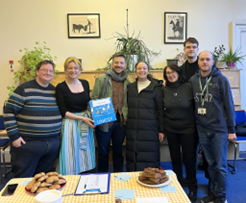

There was even some family involvement as Joe and Millie – the children of Freshman Coordinator Noelle, sent cake and cookies they had made as well as some fantastic bracelets made by Millie and her friends, Grace, Julieanne and Elsie which proved very popular with everyone.
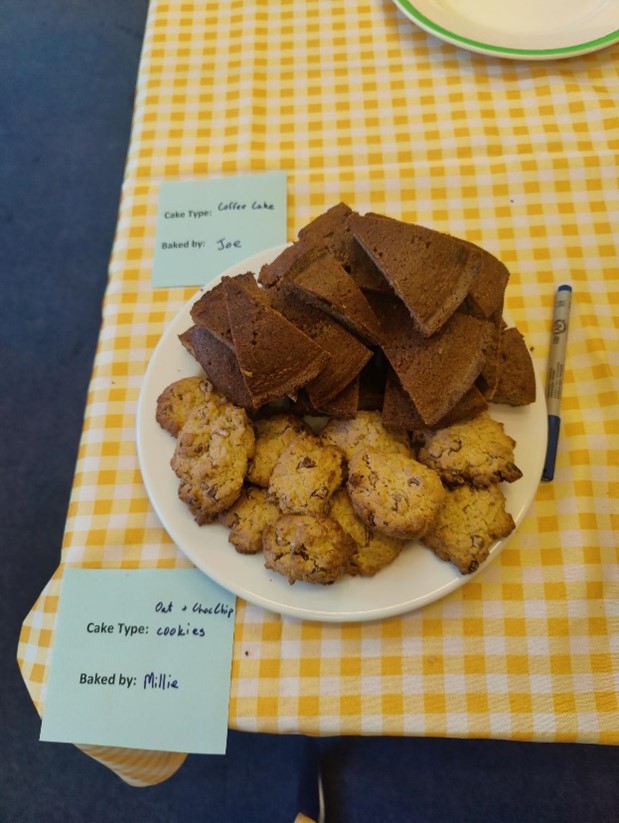

Altogether, an incredible €1473. 11 was raised for UNICEF. Prof Rozas and the School of Chemistry are very grateful for the generosity of everyone involved!

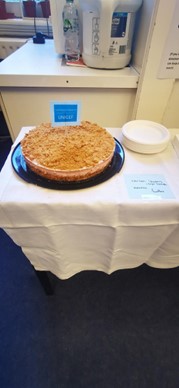
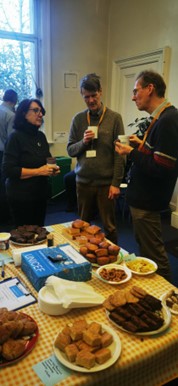
Graduation Day for Class of 2023

Thursday, October 26th was a proud day for the School of Chemistry as we saw our Senior Sophister Chemical Sciences class of 2023 conferred with their awards in the Exam Hall in Front Square followed by a reception in the Atrium. This is the culmination of 4 years of hard work on the part of all of our graduates and we wish them all the best in their future adventures
See here for photographs form the day taken by Noelle Scully and Manuel Reuther
Prof. Valeria Nicolosi receives the Diels-Planck Medal
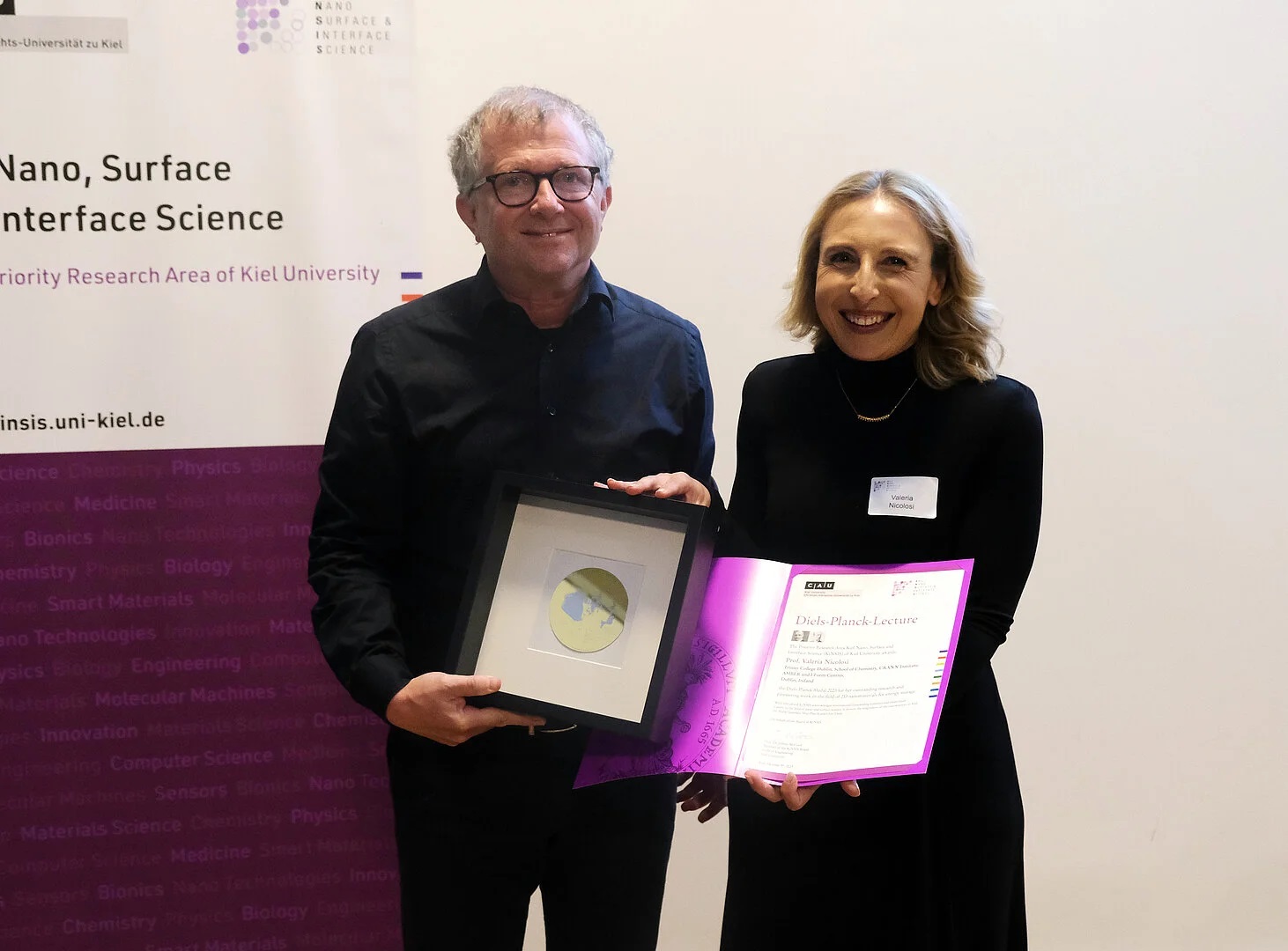
Congratulations to Prof. Valeria Nicolosi who this week was awarded the Diels-Planck Medal by the interdisciplinary network "Kiel Nano, Surface and Interface Science" (KiNSIS) at Kiel University.
This is the 10th time that KiNSIS have awarded the Diels Planck Medal for internationally outstanding researchers in the nanosciences and surface research who have significantly shaped their field. Prof Nicolosi travelled to Kiel for the award ceremony and gave a lecture entitled "Processing and applications of two-dimensional nanosheet inks" at the KiNSIS Symposium on 9 October 2023
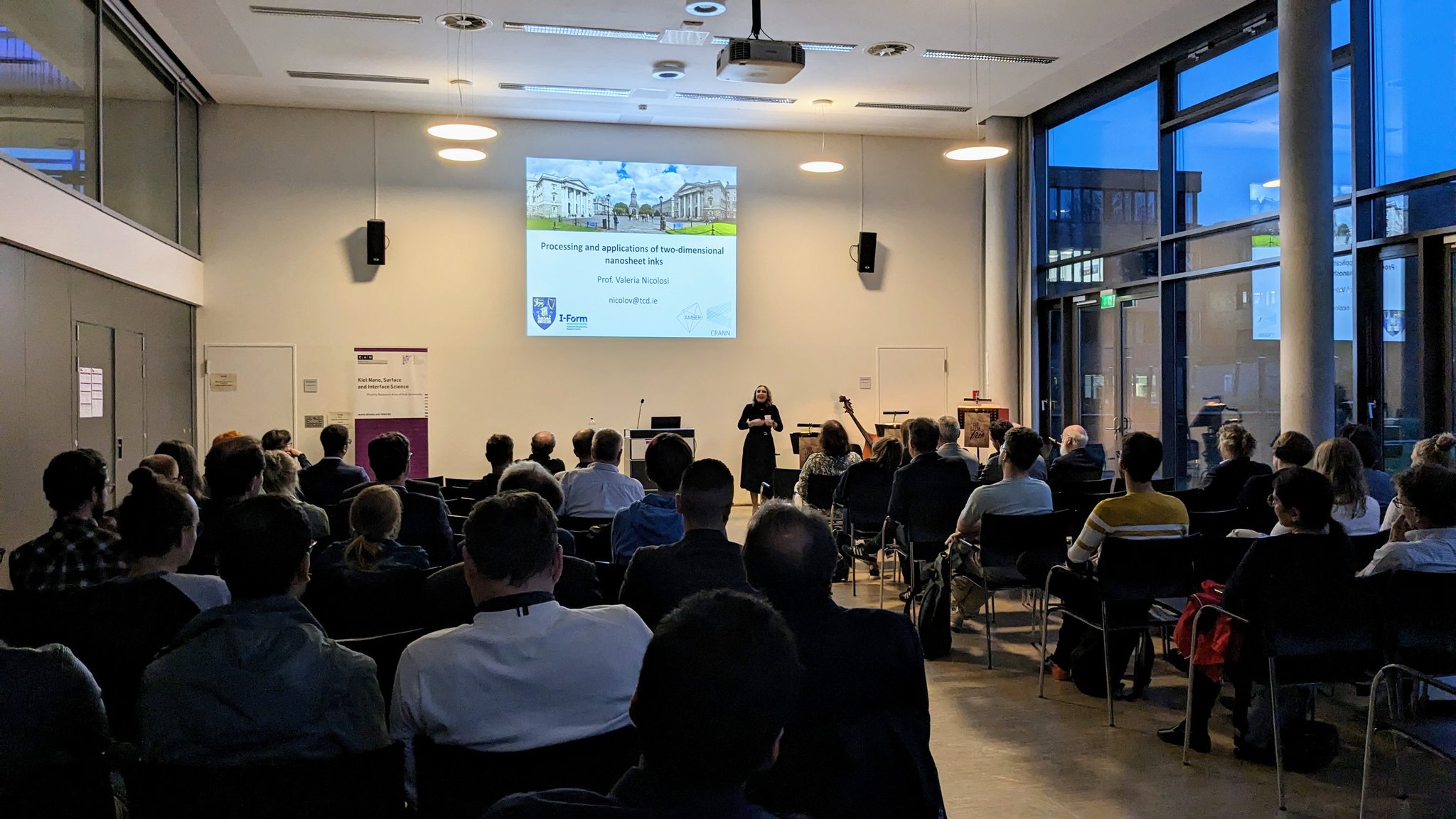
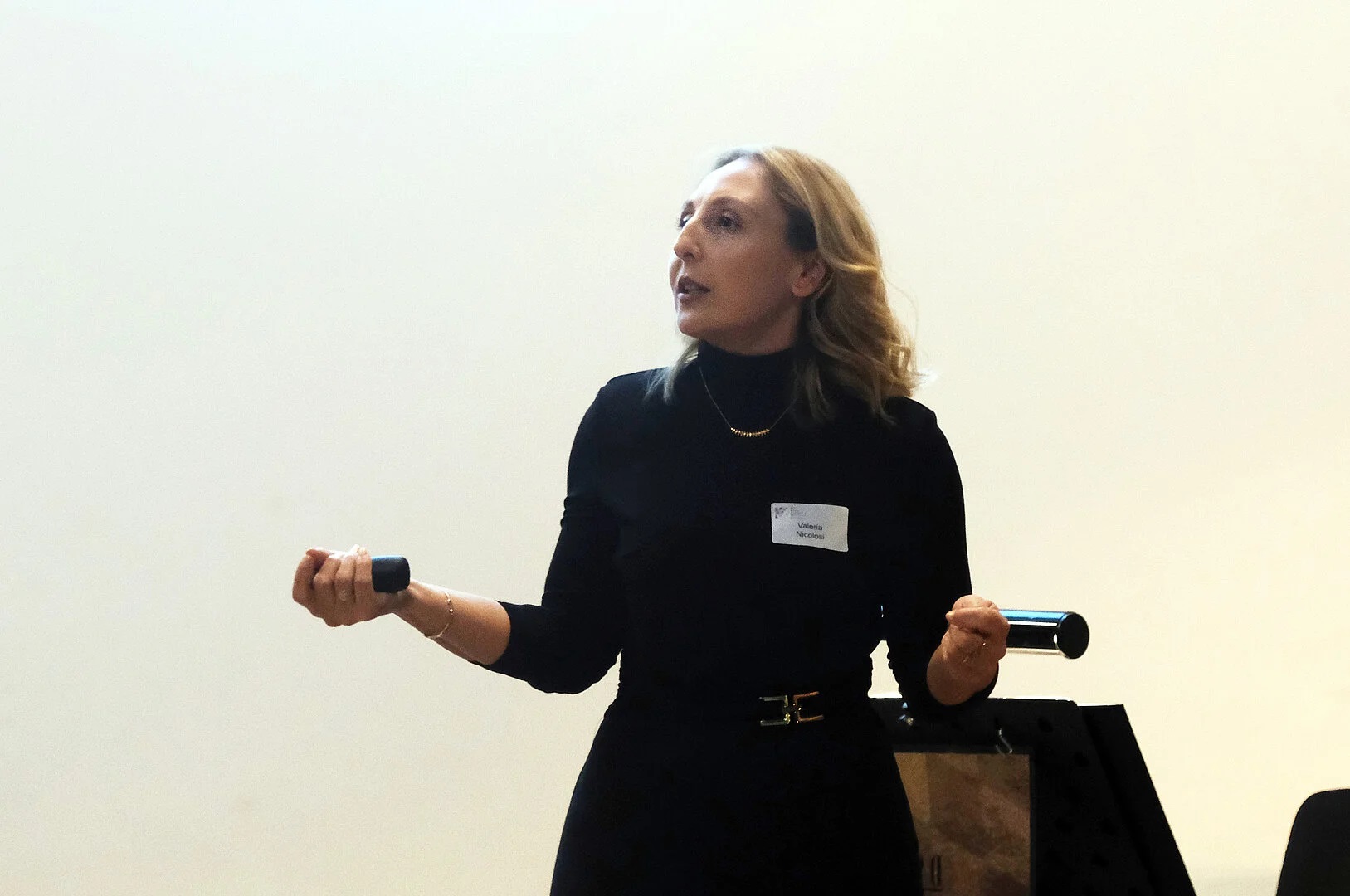
See here for more information about the award and a list of previous recipients
Photo credit: © Julia Siekmann, Uni Kiel
Intel® Rising Star Faculty Award for Prof. Larisa Florea

Congratulations to Prof. Larisa Florea who this week was awarded an Intel® Rising Star Faculty Award (RSA).
Each year, the RSA program selects 15 early-career academic researchers from across the world who are doing exceptional work and are leading the advancements in technology research that demonstrate the potential to disrupt the industry.
This award recognises Larisa’s work in the field of polymer chemistry and micro-robotics. The goal of Prof. Florea’s research is to augment the capabilities of traditional robotic tools, through the use of responsive bio-inspired polymeric constructs, to revolutionize their operation at the micro-scale.
See here for more information about the award and the 2023 recipients
Professor Emeritus Thomas Brian Hamilton McMurry R.I.P.
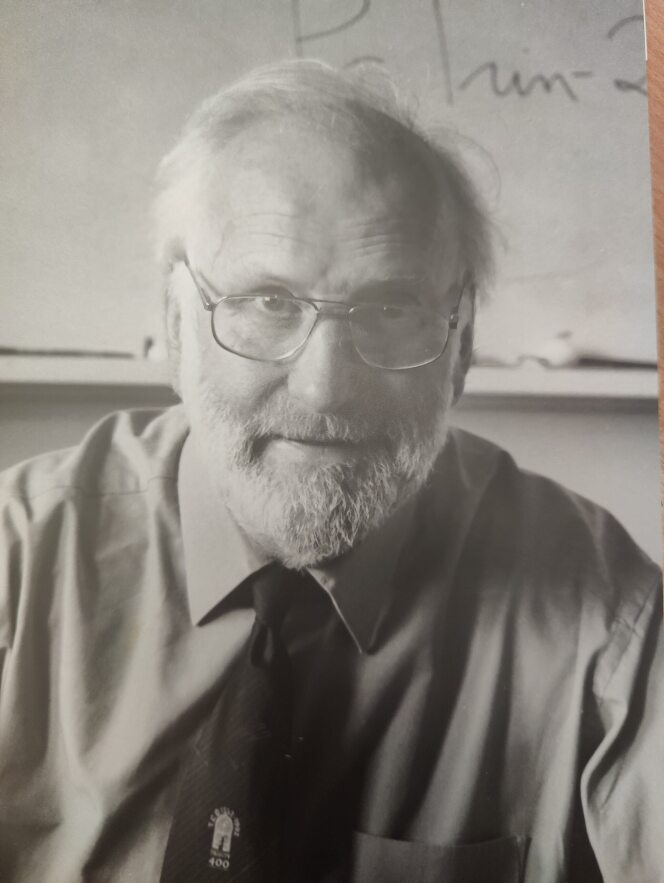
We in the School of Chemistry were deeply saddened to hear of the death of Professor Emeritus Thomas Brian Hamilton McMurry last week.
Speaking at the Funeral, Brian’s long- time friend and colleague, Peter Boyle said:
“We have lost a Colleague, we have lost a friend. We have lost one who dedicated the whole of his life to Trinity and its Chemistry department. One who will be remembered with gratitude by generations of students who studied under him, and who owe him an enormous debt.”
Brian indeed had a long and illustrious professional career which was spent mostly at Trinity College. After being elected to scholarship as an undergraduate student in 1951, he was elected to college fellowship during Trinity Week in 1959. The same year he became one of the youngest members ever of the Royal Irish Academy – the highest academic honour Ireland has to offer.
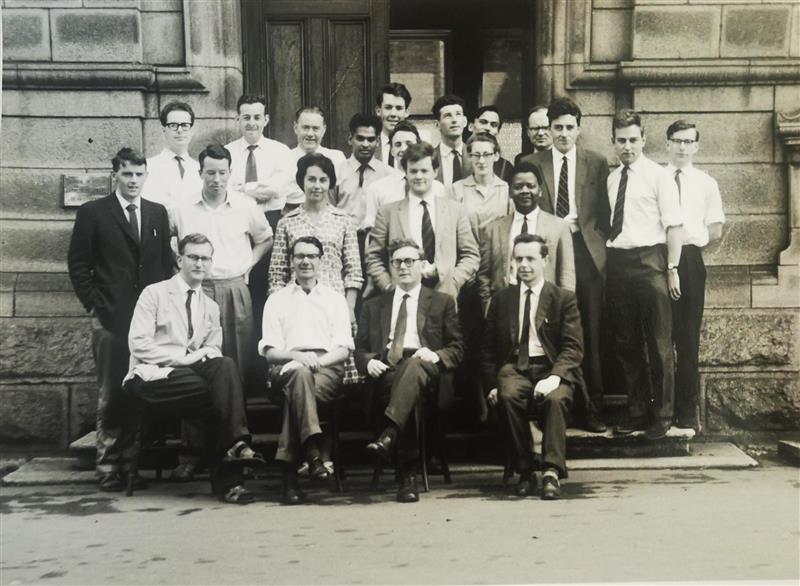
In an article to mark his 60 years as a Trinity College Fellow, Brian remembered the day of his election – Trinity Monday, 1959 as well as the events of the rest of that week:
“There were two Fellows elected in 1959. Bill Wright, Professor of Engineering, and myself. The small numbers were typical of the time. We were the first Fellows required to retire at seventy. Had I been elected the previous year, I could in theory still be a Senior Fellow!
There was a longstanding tradition that new Fellows were not in Front Square to hear their names read out. In earlier years, they would not have known whether they had been elected or not. I had known beforehand, but I followed the old tradition. It did not last much longer, but I cannot remember who the first person to break it was. Instead I followed a Chemistry tradition and went out to Johnston, Mooney, and O’Briens Café and Restaurant in South Leinster Street to buy ‘cream buns’ for 11am coffee.
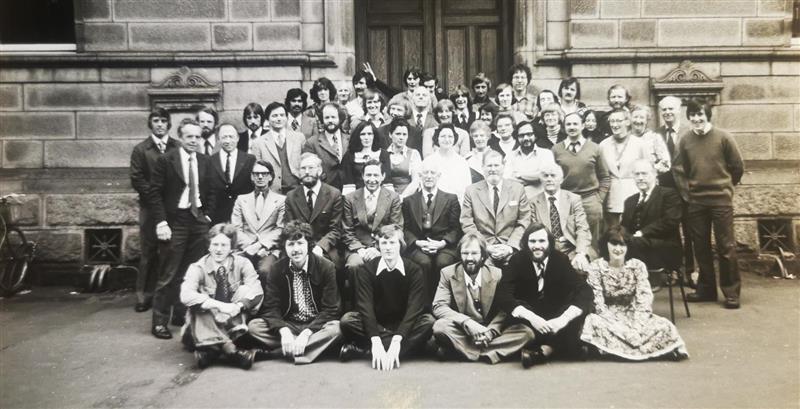
In 1959, Trinity Week started a week after Trinity Monday. The Regatta at Island Bridge was held on the Saturday before. The week itself was much more structured back then. There were hockey and cricket matches between present and past members of the clubs. The Elizabethan Society held a Garden Party in the Provost’s Garden, where the ladies showed off the latest fashion and tickets for this were highly valued by the male students!
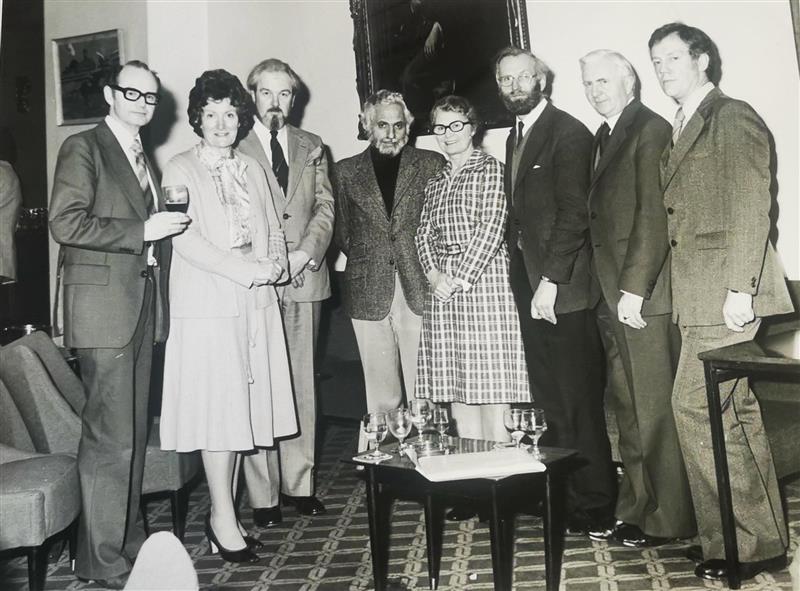
On the Wednesday, there were the College Races. The President turned up, was formally greeted by the Provost. The Garda No1 Band played the Presidential Salute, and then entertained everybody with light classics. Strawberries and cream were served to the platform party and judges and spectators alike wore formal morning dress. I remember the judges: Jacky Wallace, the College doctor, Willy Pearson, the acerbic Professor of Surgery, Harry Booker from the accountant’s office, and Vincent Denard, who is now over ninety! After the races were over, the parties began. Both staff and residential students hosted parties in their rooms and RBD French was reputed to give the best staff party. It was the only day in the year when women were allowed into student rooms after 6.00pm.
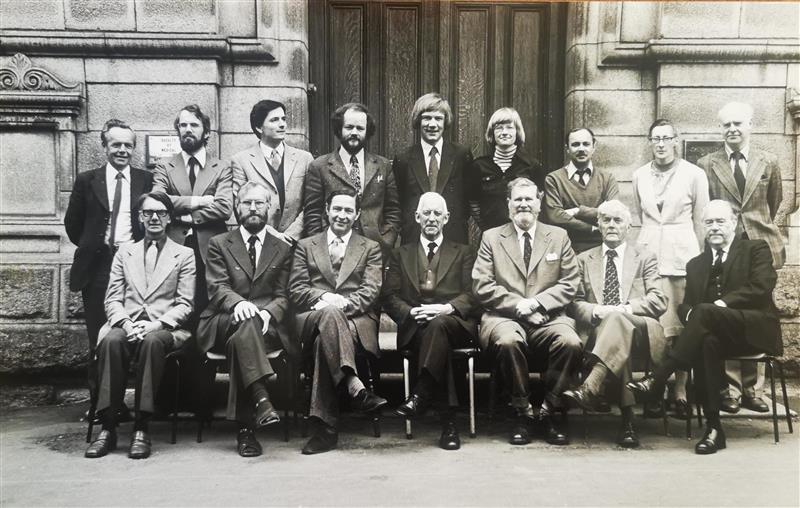
On Friday there was the Ball which, in 1959, was held in College for the first time. When I was a student, it had been held outside College. There were two venues, the Gresham Hotel and the Metropole Ballroom, both on O’Connell Street and Students had to choose between them.
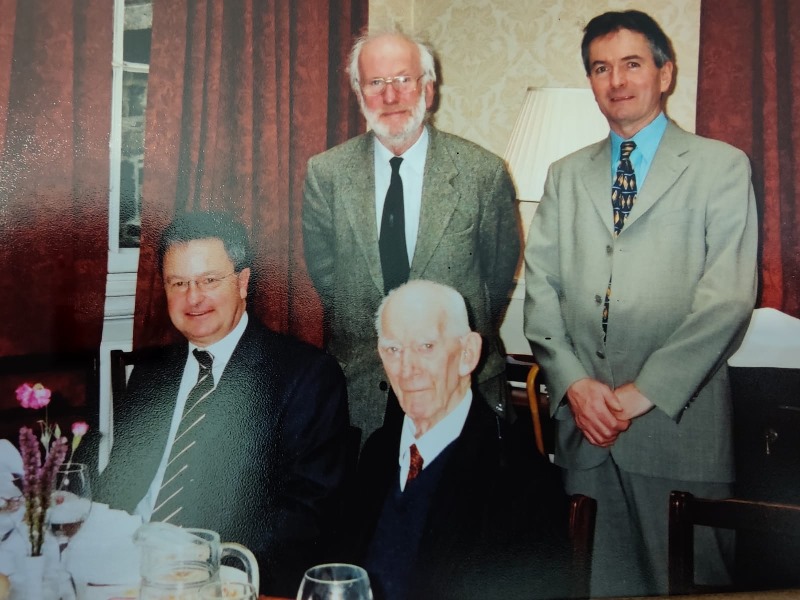
One final memory. At the New Fellows Dinner, the Provost introduced Bill Wright, referring to his career before he came to College, undergraduate in Glasgow. interrupted by Army service in the Royal Engineers during the war, graduated in Glasgow, PhD in Aberdeen, staff member at the University of Southampton. He then turned to me. I was, he said, ‘A Trinity man, pure and simple’.
My case rests.”
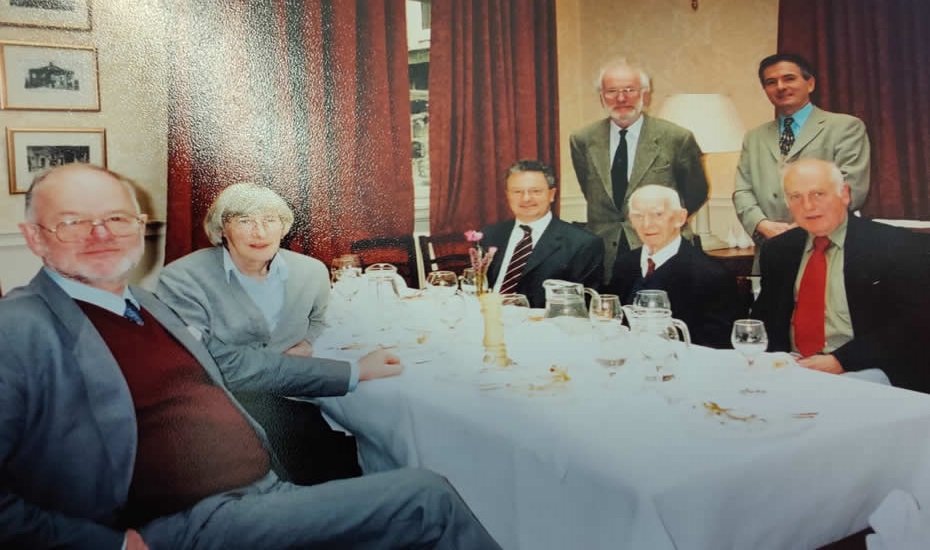
Brian retired from teaching in 2001, after a career commencing in 1956 as a junior lecturer in Chemistry. 1961-2 was spent in Harvard University working for Professor R. B. Woodward on the synthesis of vitamin B12. In 1964, his work at Trinity College Dublin sent him to the University Lagos as Professor of Chemistry, helping establish the department there. The placement was to take several years but the university was disrupted by political unrest, and he returned one year later. He was involved with the Overseas Students Relief Fund which was set up to help Nigerian students in Ireland cut off without funds due to the Biafran War. This was subsumed into the Irish Council for International Students, and Brian remained involved for many years. Associate Professor of Organic Chemistry in 1967, and Professor of Organic Chemistry in 1977. He was awarded an ScD during his career and made a member of the RIA in 1959, acting as Treasurer for several years. He served College as Dean of Graduate Studies 1967-73, was in charge of the Graduate Student Residences in Westland Row and started the Graduate Students' Union (which became the Postgraduate Student Union). He served as Registrar 1989 and was Pro-Vice Provost during a time when his son Nicholas received his own MA, and his wife Sara received an MA jure officio. He continued to come into the School most days following his retirement and was a regular fixture at the 11am coffee break in the Chemistry building until it had to close due to Covid in March 2020.




Speaking at an event to celebrate Brian’s long years of service to the college, then Head of School, Professor Mike Lyons said:
“For many years Brian has been an integral part of the fabric of, not only the School of Chemistry, but of Trinity College itself. He is the epitome of the cultured multifaceted Trinity man who acts, due to his continuing almost daily presence within the School, as an active link between the ‘old’ Trinity of years past and the modern Trinity of rapid change and flux facing the demands and opportunities of the early 21st century”.

That link was immortalised at the last college event that Brian was able to attend in May 2023. A portrait of him, painted by Hungarian artist Zsolt Básti was unveiled in the Senior Common Room and now hangs as a permanent memorial to a man who so enriched the college and its staff and students during his lifetime. He will be very sorely missed by all of us who were blessed to have known him.
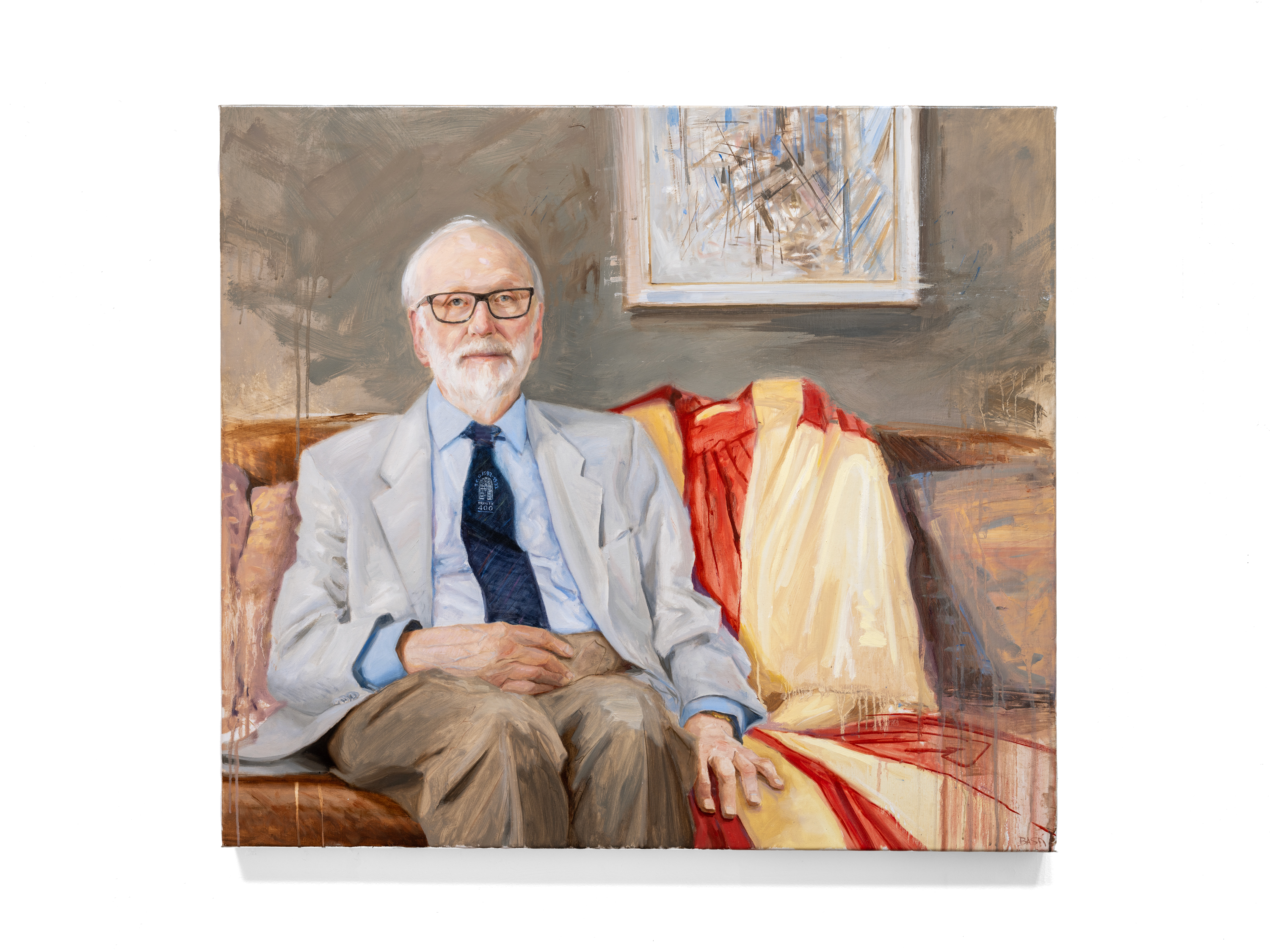


R.I.P. Professor Thomas Brian Hamilton McMurry, and thank you for all you did.
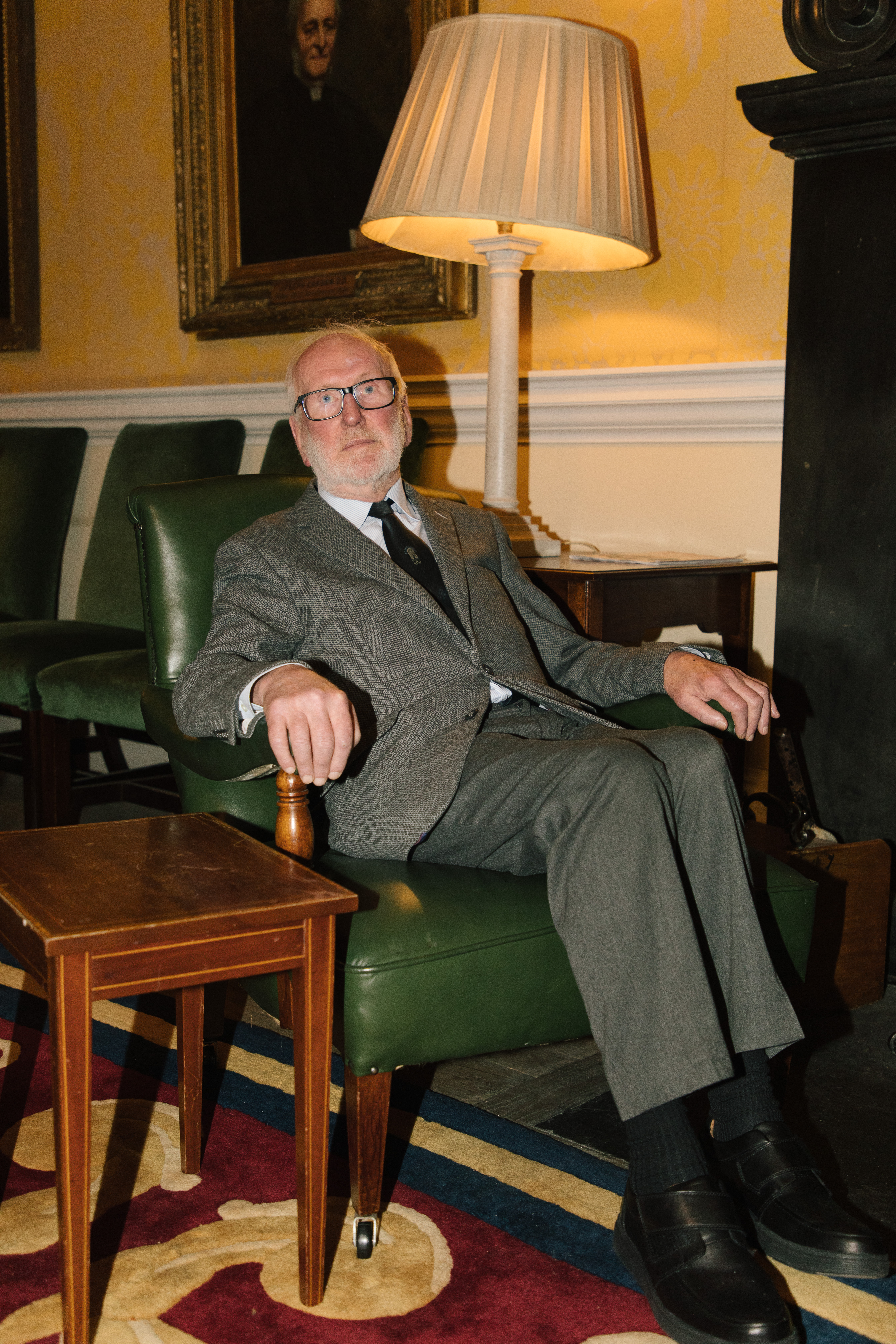
Athena SWAN Silver Award for the School of Chemistry
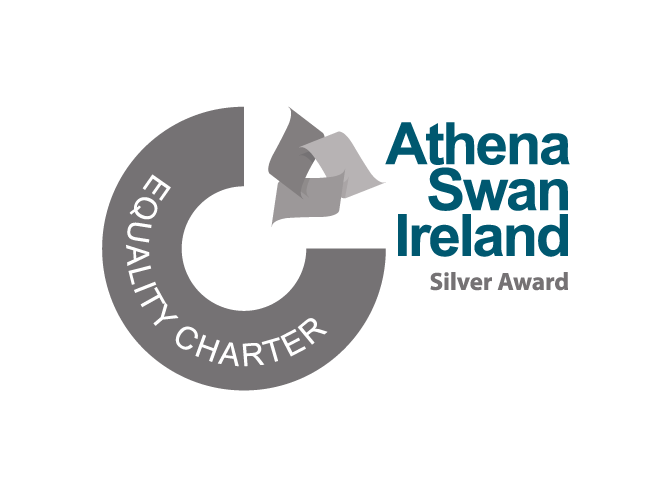
The School of Chemistry was delighted to discover last week that our recent application for an Athena SWAN Silver Award had been successful. The school has been a participant in the Athena SWAN programme since 2014, being awarded our first Bronze award in 2015 and retaining it in 2019. In achieving the Silver Award we have become one of the first departments in the college to reach this level alongside the School of Natural Sciences who also achieved their Silver award in this round. Trinity College Dublin is now also only the second university in the country to be awarded a Silver level Institutional Award, joining the University of Limerick who achieved theirs in 2022.
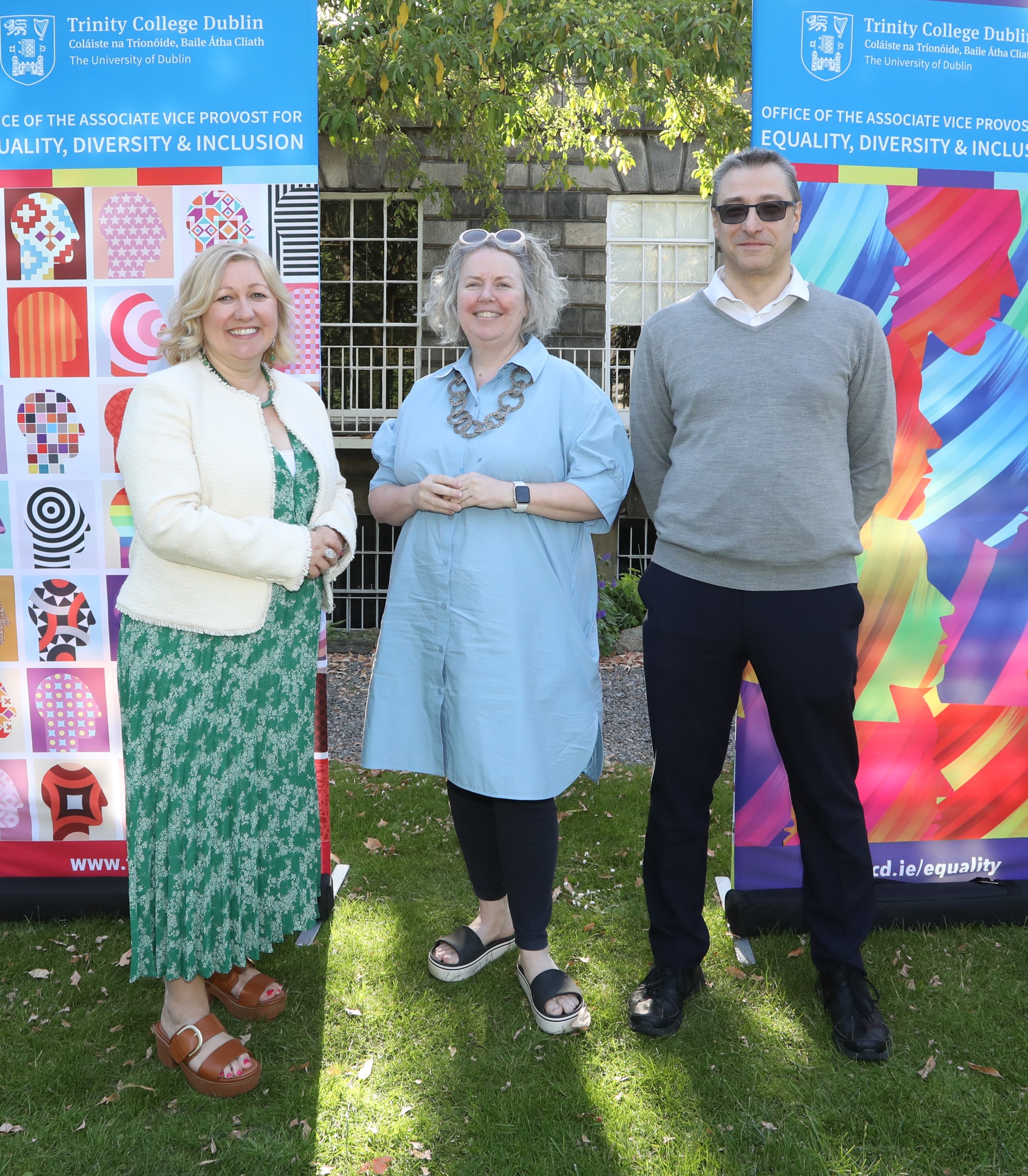
Athena SWAN (Scientific Women’s Academic Network) is a charter established and managed by the British Equality Challenge Unit in 2005 that recognises and celebrates good practice towards the advancement of gender equality: representation, progression, and success for all. Information about Athena SWAN can be found here
Speaking about the achievement, Professor Graeme Watson, Head of School of Chemistry & Athena Swan Champion, and Dr Larisa Florea, Associate Professor, Athena Swan Champion said:
“Gaining an Athena Swan silver award is validation of our work and efforts over many years to gain traction and show impact when it comes to equality, in particular gender equality in our School. We are thrilled to receive this important recognition in the form of an Athena Swan silver school award today."
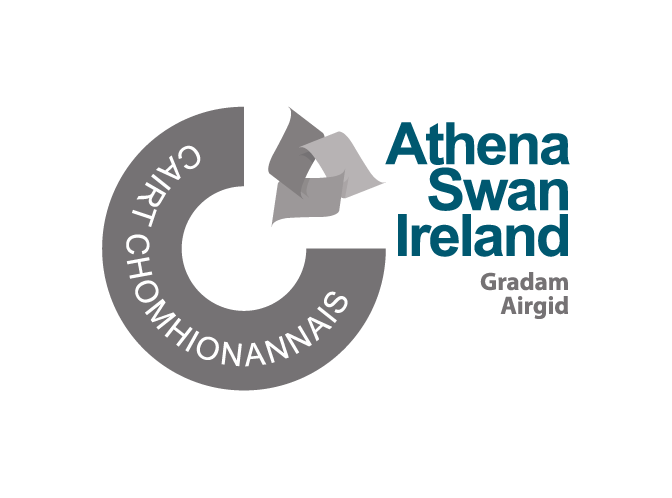
For further information about Equality, Diversity and Inclusion in the school of Chemistry, see here.

